#SoulShipping
Explore tagged Tumblr posts
Text

yubel and judai commission ❤️
#IM SO HAPPY I GOT TO DRAW THIS YUBEL FORM!!!!!!!!!!!!#ITS SO COOL!!!!!!!!#yugioh#ygo gx#yugioh gx#judai yuki#jaden yuki#yubel#soulshipping
151 notes
·
View notes
Text
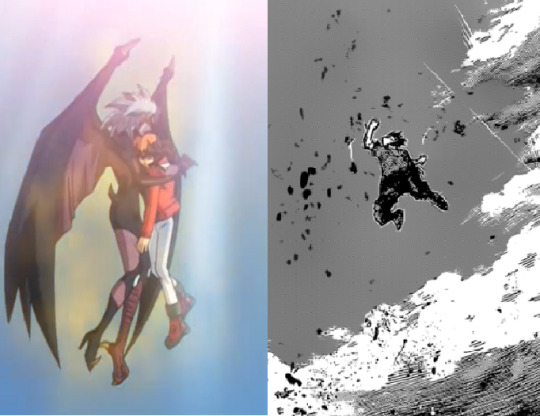
SHIGARAKI VS. YUBEL: HOW TO SAVE YOUR VILLAIN
The failure of Deku to save Shigaraki isn’t just a tragic conclusion for Shigaraki’s arc, it’s also My Hero Academia failing as a story. When I say the story failed, I mean the story has failed to answer any of the questions it asked its audience. It’s themes, character arcs, everything that communicates the meaning of the story to the audience is no longer clear.
Saving Shigaraki was the central goal of not only the story itself, but the main character Deku. By failing in its goal you can’t call this a good ending. In order to illustrate why this goal of saving the villain is so important to both Deku’s character and the central idea of MHA, I’m going to provide a positive example in Yu-Gi-Oh GX were the main character Judai successfully saves their villain. One of these stories fails, and the other succeeds. I will illustrate why under the cut.
BROKEN THEMES = BROKEN STORY
When artists draw they have to consider things like perspective, anatomy, shading, light, coloring. Drawing has rules, and it’s hard to produce good art without knowing these rules beforehand. If I draw something that has bad anatomy, you can criticize me for that.
Writing has rules, just like drawing. The rules of storytelling are important because writing is an act of communication. You can write whatever you want, just like how you can draw whatever you want, but if you break the rules the audience won’t understand what you are trying to communicate.
When I refer to MHA as a broken story, I am referring to the fact that it has broken the rules of storytelling. As this youtuber explains.
“I guess we should first define what broke and broken even means in this context. Has the story turned into an unintelligible mess? Not really. Value judgements aside, the narrative is still functional and fulfills the criteria of being a story. So how can a story that still functions be broken? Maybe to you it cannot. But to me a story that is still functional isn’t enough. What I mean when I say MHA is broken is that it’s lost something crucial. A codifying style of structure, pacing and payoff that until a certain point was the core of its identity.”
I could launch into a long-winded explanation of what themes are, but for the sake of simplicity I like to define themes in terms of “Ask, and answer.” The author asks a question to the audience, and then by the end of the story provides an answer. The audience is also invited to come up with their own answer which prompts them to think about the story on a deeper level. The question both MHA and GX are asking both its main characters and the audience is “Can you save the villain?” with the additional complicated question of “Should you save the villain?” This post will detail how both stories go about answering those two questions, and more importantly why those answers matter for the story.
With Great Power… You know the rest.
My Hero Academia and Yu-Gi-Oh Gx are actually similar stories once you get past their superficial differences. MHA is a story with way better worldbuilding, compared to a society where everything revolves around the trading card game, and people go to school to be better at a trading card game.
However, if you get past that. They are both bildungsroman, stories about the main characters growing up into adults. They both have an academy setting where the goal is for the main character to graduate and enter the adult world. They are both shonen manga. GX is the sequel of Yu-Gi-Oh a manga that ran in Shonen Jump the exact same magazine as MHA. The biggest point of comparison is their main characters, who both start out as young and naive who are driven by their admiration of heroes. Deku is a fan of All Might who wants to become a hero despite not having a quirk, because he loves All might who saves everyone with a smile. Judai’s entire deck archetype revolves around “Elemental Heroes’ and later “Neo-Spacians” who are all based on popular sentai heroes like ultraman.
The central arc for both characters is to grow up. Growing up for both of them not only requires figuring out what kind of adult they want to be, but also what kind of hero they want to be.
Now I’m going to drastically oversimplify what a character arc is.
A character arc first starts out with the character being wrong. Being wrong is essential because if the character is right from the beginning, then there’s no point in telling the story. A character often holds the wrong idea about the world, or has some sort of flaw that hinders their growth. The narrative then needs to challenge them on that flaw. It usually sets up some kind of goal or win condition. That flaw gets in the way of a character “winning” or achieving their goal, so they need to fix that flaw first. If their ideals are wrong, then they need to think about what the right ideals are. If they’re too childish, they need to grow up. If they have unhealthy behaviors or coping mechanisms, they need to unlearn it and require better ones. Otherwise, that flaw will keep sabotaging them until the end.
I’m borrowing the word “win condition” from class1akids here because it’s an incredibly appropriate terminology. Midoriya needs to do “x” in order to win, otherwise this victory doesn’t feel earned. The “x” in this case is usually character development. As I said before, a story where the main character hasn’t changed from beginning to end feels pointless. Especially in Deku’s case, he was already a brave, strong hero who would charge right into battle and defeat the bad guys in chapter one, so him defeating Shigaraki in a fist fight doesn’t represent a change.
The story sets up not only “What does the hero need to do to win?” but also “How does the hero need to change in order to win?” A character either meets these requirements before the end of the story, or they don’t and usually this results in a negative ending.
MHA in its first half quite clearly set up both the final conflict of saving the villains, and also that saving the villains is its “win conditions.” The hero shouldn't be allowed to win without first fixing this flaw.
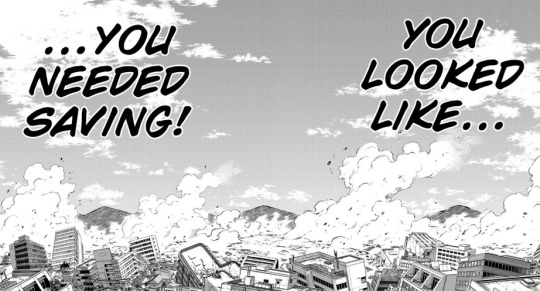
From this panel onward the central question Deku is forced to answer shifts from “Am I strong enough to defeat ShigarakI” to “Can I save Shigaraki?” However, much earlier than that All Might goes on to basically set up the win conditions of what makes the ultimate hero as someone who “Saves by winning, and wins by saving.”
All might: You can become the ultimate heroes. Ones who save by winning, and win by saving.
Therefore the story has set it’s criteria for what kind of hero Deku needs to become. If he wins without saving, then he’s failed to become what the series has set up as the Ultimate Hero.
Shigaraki and Yubel aren’t just narrative obstacles, or boss monsters to be killed like in a video game. They are narrative challenges, which means that the character can’t grow in any way if they don’t answer the challenge presented by the characters. They are villains who actively resist being saved, to provide a challenge for two heroes who define their heroism by saving others. The challenge they pose adds a third question to the story and the main characters.
"Can I save the villain?"
"Should I save the villain?"
"If I don't save the villain, then can I really call myself a hero?"
In other words the decision they make in saving, or not saving their final antagonist defines what kind of hero they are. In Deku’s case it’s even more critical he defines what hero he wants to be because the MHA is also a generational story, and several of the kids are asked to prove how exactly this generation of heroes is going to surpass the last one. The kids growing physically stronger than the last generation isn’t a satisfactory answer, Deku getting strong enough to punch Shigaraki hard is not a satisfactory answer, because we are reading a story and not watching a boxing match.
I’m going to focus on the last two questions though for a moment. Many people who argue against saving villains like Shigaraki argue he is a mass murderer and therefore isn’t worthy of salvation. However, the act of saving Shigaraki isn’t a reflection of Shigaraki himself, but rather the kind of hero Deku wants to be. It all boils down to Spiderman. In the opening issue of Spiderman, teenage Peter Parker is bitten by a radioactive spider and suddenly gains super strength, the ability to stick to walls along with other powers. However, being a teenager he uses these powers selfishly at first. He doesn’t feel the obligation to use his powers for other people, and therefore when he sees a robbery happening right in front of him he lets the robber go. However, because he lets the robber go, the robber then attempts to hijack a car and kills his Uncle Ben in the process. If Spiderman had stopped the robber then he might have prevented that from happening. He had the power to stop the robber, but he didn’t feel responsible or obligated to save other people. As a result Uncle Ben dies. It’s not enough to have power, ti’s how you use that power that reflects who you are, therefore: “with great power comes great responsibility.”
The choice to save Shigaraki actually has little to do with whether or not Shigaraki is redeemable, but rather how Deku chooses to use his power, and what he thinks he is responsible for reflects who Deku is as a person. Deku himself also clearly outlines how he wants to use his power, that One for All is a power for saving, and not killing.
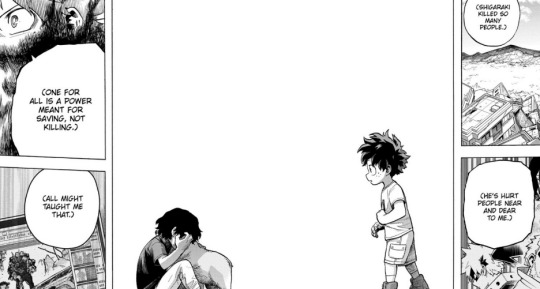
How he uses his power reflects Deku’s ideal in saving others, and therefore if he doesnt use his power to save, then he’s failed to live up to his ideals. It's not whether it's morally right to save a murderer like Shigaraki, but rather the way Deku wants to choose to use his power. It's about whether he feels the responsibility to save others.
Judai explores an incredibly similar arc to Deku. They are basically both asked what kind of responsibilities a hero is supposed to have, which is also a metaphor for growing up to handle the responsibilities of adulthood. As both characters start out with incredibly naive and childish ideas about what a hero is. Therefore realizing what a hero is responsible for is key to them growing as a character. However, Judai is different from Deku. In some ways he’s more like Bakugo. Judai is a prodigy who’s naturally good at dueling. He doesn’t duel to save others, but rather because duels are fun and he’s good at it. He’s very much like Bakugo, who admired All Might as a hero just as much as Deku did, but admired the fact that he was strong and always won rather than he saved others.
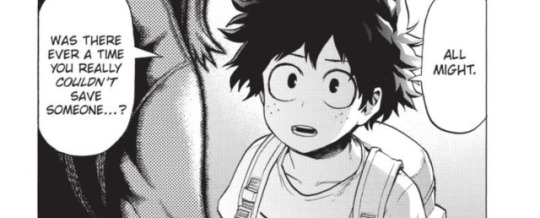
However, I would say both Deku and Judai are questioning what a hero is responsible for. They are both asking if they have the responsibility to use their power to save others. If they have to fight for other people, just because they have power. His first big challenge as a character comes from Edo Phoenix, who calls out Judai for not thinking through what it means to be a hero, and what responsibilities heroes carry. Judai duels because he thinks it’s fun. He will show up to duel to help his friends, but that’s because he’s the most powerful person in the group. Even then it’s because he finds fighting strong opponents to be enjoyable. Bakugo will beat up a villain, but for him it’s more about winning then if the action will save someone or not.
Judai is more often than not pushed into the role of being a hero, he doesn’t play the hero because he’s a particularly selfless person, and he’ll often avoid responsibility if not forced. He has power but no sense of responsibility and the narrative calls them out as a problem.
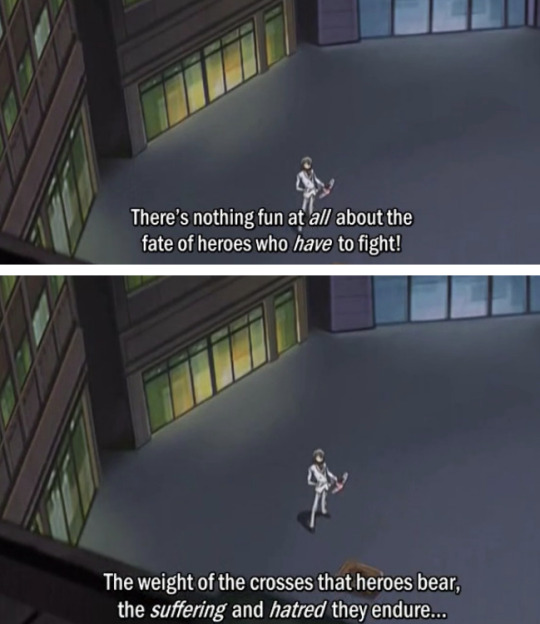
Edo: Can you even fathom that, Judai?
For Judai, he can’t understand the responsibility of being a hero. For Deku, he idealizes heroes so much he can’t understand that there are people out there the heroes have failed to save. These two callouts towards Deku and Judai are discussing similar because they’re both discussing where a hero’s responsibilities lie. Is a hero responsible for saving everyone? Is someone strong like Judai responsible for using their strength to help other people?
Judai’s arc continues into the third season where he’s not shown to just be naive but ignorant. He’s not just childish, he actively resists growing up because he doesn’t want to take on adult responsibilities.
THe same way that Deku just decides not to think about whether or not All Might failed to save people in the panels above. However, in Judai's case he's actively called out for his choice to remain ignorant.
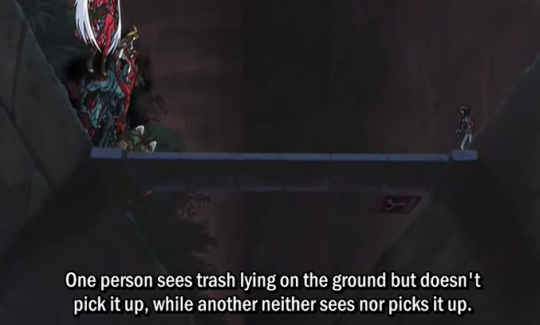
Satou: Now, which one is at fault? Judai: Isn’t it the guy who saw it, but didn’t pick it up. Satou: Not quite. If one is aware of the trash that fell, it may be picked up someday. But there is no possibility fo the unaware one ever picking it up. Judai-kun you are the foolish one unaware of the trash that has fallen. Judai: Are you calling me out for how I am? Satou: Your behavior towards me was atrocious. The worst was attending class only for credit, even if you were there you only slept. Judai: Yeah, I know. I was all bad, but it wasn’t that big a- Satou: It is important. You see, one by one, the students inspired by your attitude were losing their motivation. Now if you were a mediocre duelist, then this would not be an issue. Satou: However, you are the same hero who defeated the three mythic demons. Every single student in the academy admires you. You should have been a model for this academy. Judai: Me, a role model? Are you kidding? I just do whatever I feel like doing. Satou: Great power comes with great responsibility. Yet, as you remain unaware of that, you’ve spread your lethargy and self-indulgence.
seems like a minor issue, but look how Judai responds to the accusations. “I just do whatever I feel like doing.” Satou is arguing that Judai should pay attention to the influence he has on others because of his power, because how he chooses to use that power affects others. However, Judai chooses to actively not look at the consequences of his actions because he doesn’t want to take on that level of responsibility, and therefore he’s looking away from the trash.
While it seems like it doesn’t matter in Satou’s specific example, not thinking of the consequences, or how you use your power can have unexpected consequences. Spiderman doesn’t feel like it’s his responsibility to stop a bank robber, and that bank robber shoots his uncle. You could still argue it’s not Spiderman’s responsibility to stop every crime in the world, and I guess no one owes anyone anything from that point of view - but Spiderman failing to act responsibility had the consequence of directly hurting someone else.
Spiderman has to live with that consequence because it was his own Uncle that was hurt. This is where we really reach the duality of Judai.
In GX, Judai is, symbolically speaking, The Fool of the Tarot Deck, the Novice Alchemist — a person brimming with infinite potential, yet one who is also supremely ignorant, who walks forward with his eyes closed and often unknowingly causes harm in his great ignorance. In this, he is very much the embodiment of the faults we most commonly associate with teenagers — selfishness, recklessness, shallowness, a lack of dedication or empathy when it’s most needed. Like most people, he has good traits that work to balance out some of the above, but his narrative path through GX ends up being that of the flawed hero undone by his faults — and then that of the atoner, the repentant sinner. In his case, the mistakes of his teenage years are the catalyst for his growth from a boy into a man burdened with duty and purpose. Judai is someone with infinite potential, with great power, but also ignorant on how he should use that power, and that makes him an incredibly flawed hero who needs to learn how that power should be used.
Deku similarly exists in a society where heroes deliberately turn a blind eye to the suffering of a certain type of victim. Shigaraki’s speech heavily resmebles Satou’s speech about garbage on the side of the road.
Shigarali: "For generations you pretended not to see those you coudln't protect and swept their pain under the rug. It's tainted everything you've built."
Deku shares Judai’s ignorance, because he’s not only a part of a system that doesn’t even see trash on the side of the road, but he also worships heroes so much that he’s incapable of criticizing them. If Deku saw the flaws of heroes, but at first didn’t have the courage to speak out, but eventually gained the courage that would be one thing. However, if he doesn’t see the flaws of heroes, then the problem will never be fixed.
There are also consequences for both Judai and Deku failing to use their powers responsibly. These consequences take the form of the villains who came about because of all of society’s ignorance to the suffering of victims (Shigaraki) and because of the main character’s ignorance to their suffering (Yubel). Shigaraki and Yubel are also explicitly victims that the heroes failed to save, turned into villains who are active threats to the heroes.
Should I save the villain?
The answer is yes, because the decision to save is reflective of the kind of hero each character wants to be. Each story clearly sets up that Deku and Judai aren’t punisher style heroes who shoot their villains, they are being set up as heroes who save. Deku needs to “save by winning.” As for Judai, a big deal is made of Judai’s admiration for another character Johan who represents a more idealistic kind of hero. Johan unlike Judai is someone who duels with a purpose, something Judai outright says he admires because he’s empty in comparison.
Judai: Johan what have you been dueling for? See, it’s about fun for me… Well, for the surprise and happiness too. I guess I do do it for the fun. Sorry, I guess I put you on the spot by asking out of nowhere. Johan: What’s this about Judai? Judai: It’s nothing. Johan: I suppose there is one goal I have. Johan: Even if someone doesn’t have the power to see spirits, they can still form a bond with a spirit. That’s why I do it for people like him. [...] Johan: I'll fight for everyone who believes in me, and I'll do it with my Duel Monsters. Judai: I'm jealous you've got feelings like those in you.
Becoming a hero who uses their power to help others isn’t just a goal the story sets for Judai, it’s a goal that Judai sets for himself because of his admiration for Johan. Johan represents the idealistic hero Judai wants to be, but is also held back from because of his personality flaws. Johan represents the kind of heroic ideal that Deku is aspiring to be.
Johan’s ultimate goal isn’t punishing the wicked, but to use his power to save others.
Johan: Judai, it was my dream to save everyone through my dueling!
The story sets up the idea that it’s not enough for Judai to simply be strong, he’s also challenged to become a savior who uses his power to help others like Johan. Deku needs to “save by winning” and Judai needs to “Save everyone through his dueling.” However, Johan also adds another condition to what saving means. His idea of saving isn’t to defeat a villain, but rather his dream is to help connect spirits and humans together, even if there are humans who can’t see spirits. Johan doesn’t save people with the power of physical force, but rather the power of human connection.
Should I save the villain?
Here the answer is "Yes", because wants to become more like Johan someone who uses their power to help others not just for themselves. Then we reach the third question
If I don't save the villain, can I really call myself a hero?
It once again comes to power and responsibility. Heroes have great power, and they are responsible in how they use that power, if they use it irresponsibly then there are consequences. Shigaraki wants to destroy hero society, because the heroes irresponsibly use their power to turn a blind eye to everyone’s suffering.
People suffer when heroes fail to live up to their responsibilities. The entire conflict of season 3 is created by Judai failing to save Yubel. If Judai had helped Yubel when they most needed it, instead of abandoning them, then Yubel would never have been twisted by the light of destruction, would never have attempted to teleport the school to another dimension, would never have attacked all of JUdai’s friends.
These consequences matter. Deku can turn his eyes away from Shigaraki’s suffering, but let’s say a hero failed to stop a robbery, or rather he didn’t even try, and because of that his mom was shot and died in the street. Would Deku consider the man who failed to stop a bank robbery a hero? When Spiderman let a bank robber go instead of trying to stop him, was he being a hero in that moment? Both the stories and the characters themselves have defined heroes as people who use their powers to save others, therefore if Judai and Yubel fail to save their villains then they can’t be called heroes by the story’s own definition. Now let’s finally return to the question of "Can I save the villain?"
Was there ever someone you couldn’t save?
m going to start with Yu-Gi-Oh Gx as a positive example of how to save your villain. Gx works for two reasons. One, it’s established from the start that Yubel isn’t beyond salvation, and two, it makes it so Judai can’t win without saving Yubel. The conflict of the story does not end until Judai makes the decision to save Yubel. In some ways the writing is even stronger because Judai is directly responsible for the pain and suffering that Yubel went through that turned them into a villain in the first place. Yubel isn’t just a victim, they’re specifically Judai’s victim.
Yubel is a duel spirit who is also essentially Judai’s childhood friend. A duel spirit just like the kind that Johan wants to save. During their childhood Yubel got too overprotective of Judai, and started to curse his friends for making him cry or upsetting him in any way. Until everyone Judai’s age started avoiding him and Judai became all alone with only Yubel for company. Judai’s decision was to abandon Yubel at that time. He took the yubel card and shot them into space, hoping that being bathed in space rays will somehow “fix” what was wrong with them. I know that’s silly but just go with it. Judai abandoning Yubel had the unintended consequence of Yubel being subjected to the light of destruction, a corrupting light that subjected Yubel to years of pain. This pain literally takes the form of Yubel burning alive.
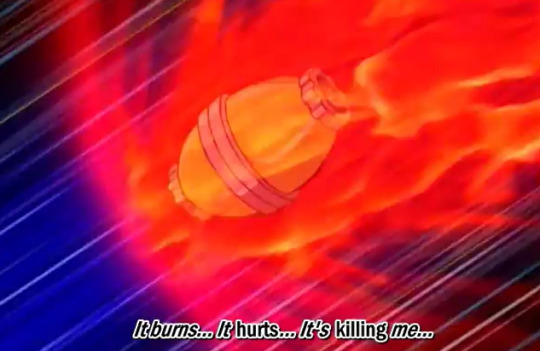
Yubel connected to his dreams called out for Judai every night, only for Judai’s parents to give him surgery that repressed his memories of Yubel causing him to forget them entirely. Yubel then spent the next ten years alone in space, continuously subjected to painful torture, with their cries for help being ignored.
"I was suffering even as you came to forget about me..."
Yubel is then met with the question of how can Judai treat them this way if they loved him so much? As from Yubel’s perspective, they’ve only ever tried to protect Judai, only for Judai to not only throw them away, but subject them to painful torture and ignore their cries for help. Judai effectively moves on with his life, goes to duel academy, makes friends while Yubel is left to suffer in silence all but forgotten. This is where Judai’s ignorance has serious plot consequences.
It’s not just the pain that Yubel endured that made them snap. It’s that their pain went ignored.
Yubel holds out the faint hope that Judai will answer their calls fro help until they finally burn up upon re-entry into earth’s orbit. At which point they’re left as nothing more than a single hand crawling on the ground. Yubel who cannot fathom why Judai would cause them so much pain, and then forget about them, convinces themselves that Judai must be causing them pain, BECAUSE he loves them.
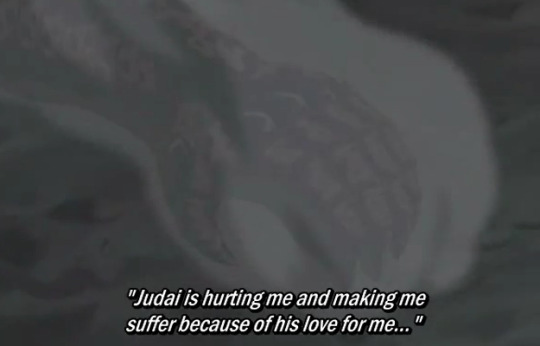
But you see, I couldn't possibly forget about you in the time that I've suffered...
Judai is allowed to move on with his life, to make friends, to spend the next ten years doing so while Yubel is subjected to ten years of agony. When they finally escape their painful torment, they see all the friends Judai has made while they’re left alone and forgotten. However, Yubel’s goal isn’t revenge. Rather, it’s to make Judai share and recognize their pain. WHich is why I said it’s not the fact that they were made to suffer, but their suffering is ignored. Yubel’s entire philosophy revolves around the idea that sharing pain is an expression of love, and that they and Judai share their love for each other by hurting each other.
"That's why I sought to fill all those linked to you, your world, with both sadness and anguish..."
For Yubel, making all of Judai’s friends suffer and Judai themselves suffer is a way of making them and Judai equals again. They want to show “their love” for Judai, but it’s more about forcing Judai to recognize the pain he’s caused them by forcing him through the same pain. Yubel’s philosophy of sharing pain is actually a twisted form of empathy.
They’re not entirely wrong either, that even people who love each other can cause each other pain, and that if one person is suffering alone in a relationship or the suffering is one-sided then there’s something wrong with that relationship.
Yubel: I get it now… You weren’t in love, with Echo. Yubel: No.. you may have loved her just enough to clear the conditions in palace for you to control Exodia, but the you didn’t truly love each other. Yubel: You were only unfairly hurting her, while you stayed unharmed. You wouldn’t suffer. You wouldn’t suffer. You wouldn’t be in pain. Amon: What are you getting at? Yubel: I’ve been hurt! I’ve suffered! I’ve been in pain. That’s why I’m making JUdai feel the same things I did!
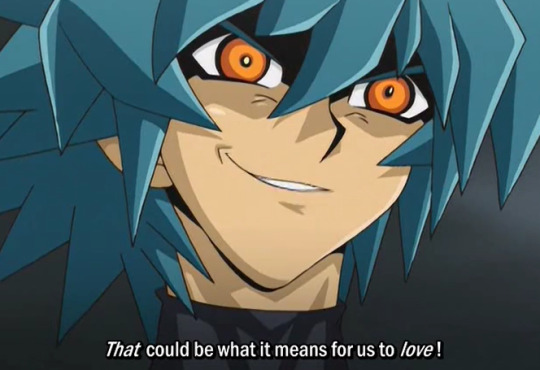
Yubel’s twisted theory of love, is a pretty thinly veiled cry for empathy.
They break out into tears when talking to Amon about the way they’ve hurt and suffered. They clearly state upfront that their goal is for Judai to recognize their love. One of the first things they say to Judai is a plea for Judai to remember them.
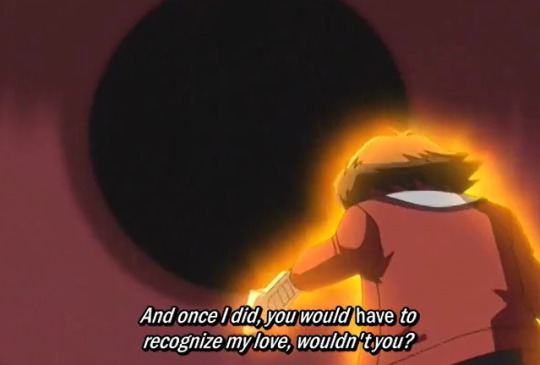
Yubel is presented as a very human character suffering through a lot of pain throughout their entire villai arc, they break down into tears multiple times, they cry out in agony, they're visibly suffering and you see their mental walls begin to break down when Judai denies them any empathy.
Yubel is actually incredibly clear and straightforward about their desire to be saved by Judai. However, Judai doesn’t lift a single finger to help Yubel the entire arc, even though they themselves admit they are directly responsible for Yubel’s suffering but they helped create who they are today.
Judai plunges into a different dimension and gives up everything to save someone, but it’s Johan, not Yubel they try to save. You have Johan, the perfect friend, and perfect victim that Judai gets obsessed over and will not stop at anything to save, and then you have Yubel, the imperfect victim that is actively harming Judai and all of his friends that Judai chooses to ignore. The whole season Judai only focuses on saving the perfect victim Johan, and this is clearly shown to be a flaw. Judai doesn’t just ignore Yubel to save Johan, he also ignores every single one of his friends.
Judai only caring about saving Johan, and deliberately ignoring and abandoning the friends who came with him to help, essentially abandoning them the way he did Yubel leads to another consequence. After he abandons them they get captured, rounded up, and actually die and become human sacrifices.
Losing his friends, causes Judai to snap. Judai becomes the supreme king and decides power is all that matters; he starts killing duel spirits en masse in order to forge the super polymerization card. Which means being left alone, suffering alone, being abandoned by everyone causes Judai to snap the exact same way that Yubel did.
In fact Judai is only saved from his darkest moment, because two of his friends sacrifice their lives, trying to get through to him and appeal to his humanity. At that point Judai’s friends could have just chosen to put him down like a mad dog, to punish him for the amount of people he’s killed, but instead they try to save him because of their friendship.
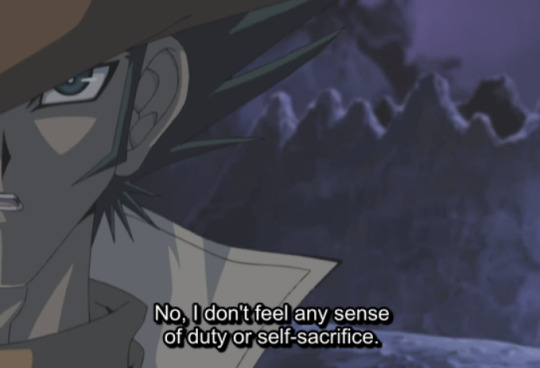
I just want to save my friend. That is all.
By the time Judai is facing Yubel in their final fight, Judai doesn’t have the moral highground against Yubel in any way whatsoever. They’ve both lashed out because of the pain they endured and killed countless people in the process of lashing out. The only real difference between them is that Judai is lucky. He had friends to support him at his lowest point, while Yubel didn’t. Does Judai learn from Jim’s example, and go out of their way to save Yubel the same way they were saved because Yubel is still a friend? Nope, Judai tries to kill Yubel at this point.
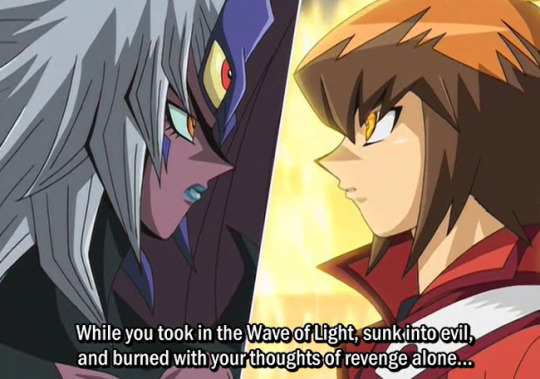
I made a lot of friends... And they all taught me something… real love is wide enough, large enough and deep enough to fill the universe. Your so-called love is only a conceited delusion.
Like, Judai, sweetie baby honey darling. How was Yubel supposed to make friends when they were floating in the empty void of space?
Judai hasn’t learned, they are still ignorant, and still turn a blind eye to Yubel’s suffering. After all if his love is wide enough, large enough,and deep enough to fill the universe then why don’t thy have any room in their heart whatsoever for empathizing with Yubel?
Judai making friends while Yubel was trapped in space doesn’t make Judai a better person than Yubel, it makes Judai lucky. Judai doesn’t even appreciate that luck, because he treats his friends like garbage. It’s not about whether Yubel is worthy of salvation, because Judai is a mass murderer and his friends still went to great lengths to save them anyway. It’s that Judai doesn’t want to empathize with Yubel, because they still want to remain ignorant and irresponsible. Judai wants to continue playing hero, with a very black and white definition of what a hero is. By this point Judai’s killed lots of people, but if he makes Yubel the villain in the situation, he can keep playing hero. He doesn’t have to look at himself and what he’s done, because blaming everything that happened on Yubel and then putting Yubel down like a mad dog allows Judai to absolve his own guilt. Judai practically ignores Yubel’s cries for help, even when Yubel spells it out for them.

I couldn't have lived with the heartache unless I felt that I was being loved...
At this point Yubel themselves acknowledges that their love was just a delusion. That it was a coping mechanism, because they couldn’t live with all the pain otherwise. WIthout it they would have just died, which makes Judai unmoved. The implication here is that Judai thinks yes, Yubel should have just died in that crater. It would have been easier for Yubel to die a perfect victim, then for Yubel to crawl out of that crater and go on to hurt other people. While that may be true the same can be said for Judai - it would have been better if Judai died rather than become the Supreme King. His friends could have put him down like a mad dog, you could have even called that justice - but they didn’t. Judai making no attempt to save Yubel isn’t because he thinks it’s morally wrong to save someone who’s killed as many people as Yubel has, or because he thinks he can’t forgive Yubel, it’s because Judai is taking the easy way out. Johan is a nice, easy victim to save, because he’s Judai’s perfect boyfriend, while Yubel is a complex victim that requires Judai to understand their suffering. Even the act of saving Johan isn’t about Johan himself, it’s about the fact that Judai feels guilt over Johan’s disappearance. What Judai wants isn’t really to save a friend, but to stop feeling guilty over that friend. Judai isn’t just disgusted by Yubel’s actions towards his friend, he also wants to avoid the guilt he feels over causing all of Yubel’s suffering, because it requires acknowledging the complex reality that he is both victim and perpretrator in this case, just as Yubel is both victim and perpetrator.
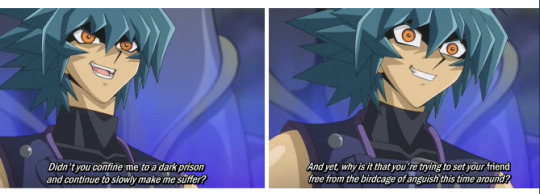
So how can an arc where Judai doesn’t try to save Yubel until the last possible minute, be better than an arc where Deku makes it his goal for the final act of the manga to save the crying boy in Shigaraki?
It’s because the story does not let Judai get away with his continual refusal to empathize with Yubel. Yubel’s entire character revolves around empathy, in the form of sharing pain. As a duel monster, Yubel’s effect is that they are a 0/0 attack monster who is immune to all damage, but when you attack them they deal all the damage back to you. Which means that Yubel will respond to all the pain they feel, by causing you just as much pain in return. Yubel is not a character who can be defeated in a fight, or a duel. In fact they’re the only Yu-Gi-Oh villain who never loses a duel once. The most Judai can do is duel them to a draw, and they draw three times. Yubel wins against everyone else who challenges them. In a way Yubel is like Shigaraki, the ultimate, unkillable enemy that can’t be done away with violence. Judai’s refusal to empathize with Yubel or attempt communication also makes them worse, every time Yubel is hurt they escalate. THe more Judai hurts them, the more they will hurt in return, it’s a cycle that will never be broken simply by killing Yubel, because Yubel is unkillable.
Not only that but the story has gone to great lengths to show that saving Yubel is the correct course of action. If Judai doesn’t save Yubel, he’s basically spitting on the selflessness Jim showed in saving him. In fact if he doesn’t save Yubel, Judai is contradicting his own words on what makes a good friend. Sho once asks Judai after witnessing his brother change, what he should do if a person you lov ehas changed into an entirely different person. What if they're a person you don't even recognize any more? A person you don’t even necessarily like anymore?
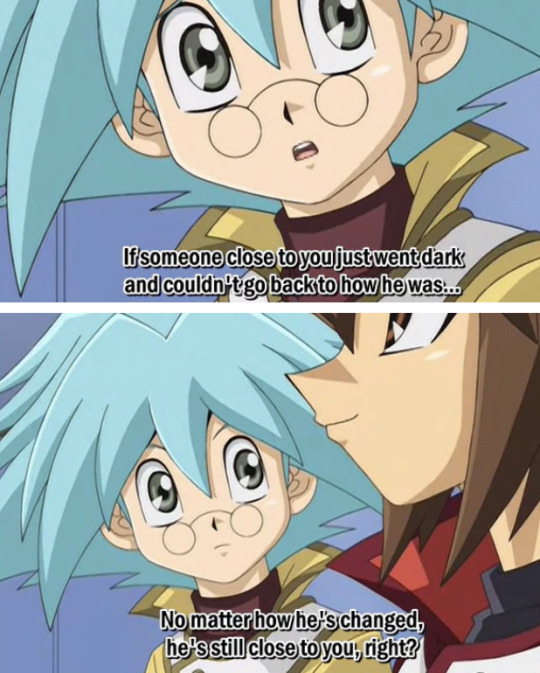
That's why if it were me. I'd probably just be looking after him until the very end, even if I didn't like him. I'd do it cause I think it'd prove that I care about him.
Judai doesn't even say that Sho is obligated to save his brother or morally redeem him, just that he has to keep looking at him instead of turning away or ignoring him.
Judai is being a bad friend, by his own definition. By choosing to deliberately look away from Yubel, Judai’s not living up to his advice for Sho for how you treat people you care about.
Which is why the resolution for Judai and Yubel’s arc is so important, because it’s done by Judai finally acknowledging Yubel’s pain, and promising to watch over them from now on, words that are followed by the action of physically fusing their souls together so they’ll never be alone again. Judai doesn’t just say pretty words about how they won’t ignore the crying child inside of Yubel, but instead he makes a sacrifice to save Yubel at risk to themselves to show their words are backed up by actions. Judai says Yubel will never be alone again, and then he commits.
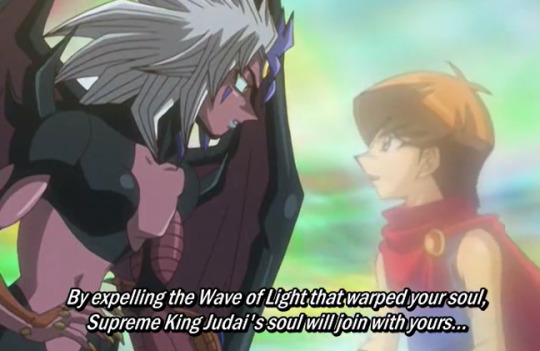
"And even if that means I won't exist anymore... I don't care."
Judai has resolved his character arc by this action, because Judai is finally taking on responsibility and that responsibility is watching over Yubel, so the two of them can atone together. Judai even says himself this isn’t an act of sacrifice on his part, but rather him finally accepting adult responsibilities.
Judai: I wouldn't sacrifice myself for you guys. I'm just going on a journey to grow from a kid into a man.
Judai needed to save Yubel to complete his character arc and grow as a person. If Judai hadn’t saved Yubel, he would have still remained an ignorant child. By learning not to turn a blind eye to Yubel’s pain, and also smacking sacrifices and physically doing something to atone for the way they ignored Yubel up until this point they’ve not only saved Yubel they’ve also done something to address their wrongs. This also continues into the fourth season where Judai’s personal growth results in him learning what kind of hero he wants to be as in Season 4 in order to atone for the spirits that Judai slaughtered, he decides to leave his friends behind and walk the earth with Yubel helping spirits and humans get along with each other. In fact Judai’s final speech as a character isn’t even about how strong he is as a hero, but how weak he is as a person.
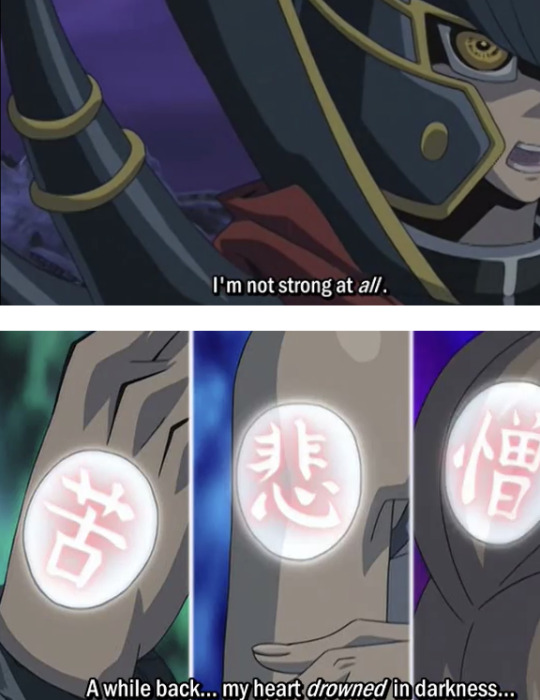
And I put my friends through some rough times. Form that, I figured a few things out... all I can do is believe in them.
The lesson Judai learned is because he’s weak, he needs to empathize and believe in other people the same way that his friends once believed in him when he was at his lowest point. Judai’s not the strongest hero, he’s the weakest one, but that gives him the ability to empathize with people who were lost just like he was, and guide them back from the darkness.
The story of how Deku became the worst hero.
I’m going to say this right now it might turn out next week that Shigaraki is just fine, and he’ll use the overhaul quirk to reconstruct his body. However, even if that happens Deku has completely failed at his goal of saving Shigaraki for the reasons I’ll illustrate below. In theory, Deku’s arc of saving Shigaraki, and therefore winning by saving should be much easier for the story to accomplish and also much less frustrating to watch. After all, Shigaraki has been around since the beginning of the manga, he’s literally the first villain that Deku faces. He’s also the first villain that Deku talks to, where he brings up the idea that there were some people All Might failed to save. There’s also many intentional parallels between the two characters, the entire manga is about their parallel journeys of becoming the next generation hero and the next generation villain. Shigaraki even directly quotes the line at one point that all he wanted was for someone in his house to tell him he could still be a hero, the same line Deku said in the first chapter was that he wanted his mom to tell him to be a hero instead of apoalogizing to him for being quirkless.
Not only is the setup for Shigaraki and Deku made obvious (Deku can redeem Shigaraki by telling him that he can still be a hero too), but Deku himself states out loud that he wants to save the crying child inside of Shigaraki.
Judai runs away from Yubel the whole time, whereas Deku is running towards Shigaraki and actively makes it his goal to understand Shigaraki and continue to see him as a human being rather than a villain. The story also makes it clear that saving Shigaraki is necessary to saving hero society as a whole. After all Yubel is just Judai’s victim. Whereas Shigaraki is the victim of all of society. He’s the crying child who was ignored. The cycle won’t be broken if heroes continue choosing to ignore people like Shigaraki, because more victims will grow up to replace him.
Shigaraki: Everything I've witnessed, this whole system you've built has always rejected me. Now I'm ready to reject it. That's why I destroy. That's why I took this power formyself? Simple enough, yeah? I don't care if you don't understand. That's what makes us heroes and villains.
Shigaraki rejects the world because the world continues to reject him. THe solution to this problem is not rejecting Shigaraki, because Shigaraki won’t go away, the system will just continue to reject people like Shigaraki. As long as heroes and villains don’t understand each other, they’ll keep being forced to fight and the conflict won’t end, because hero society is what engineers it’s own villains.
clear as day by the story itself. If the objective of saving Shigaraki is clear, then how exactly did the story fail in this objective? What went wrong? In this case it’s a failure of framing, and breaking the rules of “show don’t tell.” Stories are all about actions and consequences. When a character makes a certain action in a story, the way other characters around them, the world, and whatever consequences that action frames that action in a certain light. It provides context for how we are supposed to interpret that character in that moment.
For example, when a character does something wrong and another character directly confronts them over what they did wrong, that frames them as in the wrong. The story is criticizing the character for what they did wrong. Context is everything in a story. Stories are just ideas, so they require framing and context to communicate those ideas for the audience. Certain character attributes can be strengths or flaws depending on the context. My go to example is that if you put Othello in Hamlet, the conflict would be resolved in five seconds because Othello’s straightforward personality and determination would have him kill Hamlet’s uncle without questioning things. Whereas, Hamlet constantly questioning and second guessing himself would lead to the worst ending possible. However, if you put Hamlet in Othello, then Hamlet wouldn’t fall prey to Iago’s manipulations, because Othello doubts and questions everything so he wouldn’t believe Iago the way Othello did.
Hamlet’s contemplative and introverted nature can be a strength in one situation, and a flaw in another. Othello’s tendency to act without thinking things through can be a strength in one situation, and a flaw in another. Context matters, because context tells you how you’re supposed to interpret a certain characters actions, and therefore tells you more about that character. This is why people repeat “Show don’t tell” as the golden rule of storytelling, it’s one thing to say something about a character, it’s another to us the characters actions in the story itself to show them something about the character.
What’s even worse then breaking the rules of show don’t tell however, is telling the audience one thing, and then going onto show in the narrative something completely different. In that case the narrative becomes muddled and confusing to read. If I the narrator say “Hamlet is someone who overthinks everything” and then in the story Hamlet walks up to his uncle and kills him with no hesitation, then the narrator is straight up unreliable. It becomes impossible to tell as an author what message I’m trying to get across about these characters, because I’m telling you one thing and showing another.
This is why the writing fails in the second half of My Hero Academia because we are constantly told one thing, but then the story shows something entirely different and sometimes even contradictory to the thing we are being told.
Judai is a much worse hero than Deku, he always runs away from Yubel, and we’re never directly told that he’s supposed to save Yubel either. However, the narrative is incredibly consistent. Judai’s behavior of running away is consistent with his character. All the other character call Judai selfish for abandoning his friends (and they’re not even talking about Yubel). Judai is never painted in any positive light for his actions, therefore we as the audience understand Judai’s behavior is wrong and he needs to fix it. The narrative makes it clear that Judai needs to grow up, and Judai is never rewarded for his refusal to grow up, he’s ruthlessly chewed out, not by his enemies but also by his own friends. However, the narrative isn’t merciless on him either. Season 3 of GX is dark, but it’s not grimdark. Even when Judai loses his way, he’s still shown love and compassion by those same friends who go to great lengths for his sake. The narrative criticize Judai but it never insists that he’s beyond redemption and needs to be put down like a mad dog.
The message is very clear, that not only does Judai need to grow up, but he also deserves the chance to grow and change, which is why he should give Yubel a similar chance. In comparison the story sets out this clear narrative arc for Deku of understanding Shigaraki, but it never challenges him for failing to understand Shigaraki. If you listen to what the narrative says, how other characters describe Deku, and what Deku himself says and only read it on a surface level then yes, Deku’s goal is to save Shigaraki. If you analyze actions however, he is in effect just like Judai he never takes any meaningful action or steps towards Shigaraki, nor does he think of what saving Shigaraki might look like or entail.
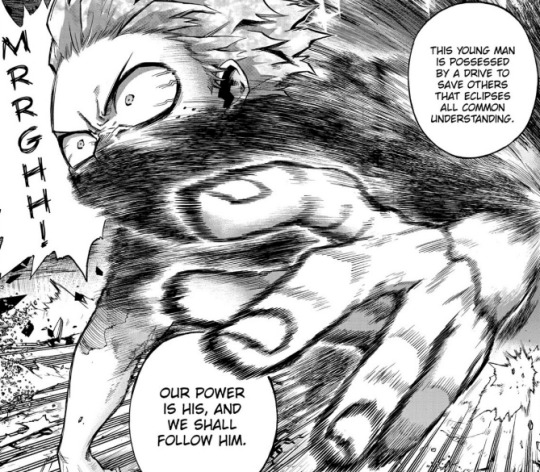
The story describes Deku as someone who is possessed by a drive to save others that eclipses all common understanding, but does the story give us any examples of that behavior?
Judai is characterized as a selfish, irresponsible child, and the story gives us countless examples of his immaturity and how it hurts others. Does the story of MHA do the same for Deku's purported virtues? Let’s run through Deku’s actions, step by step, the actions themselves and how they are framed in order to find any evidence that Deku possesses this drive to save others. Does Deku reflect at all on the question of:
Can Shigaraki be Saved?
Deku leaves on a journey to try to understand villains. When he makes a perfunctory attempt to understand and empathize with Muscle, and Muscle replies that some people are just evil does Deku keep trying to reach his heart? Nope, he just punches him.
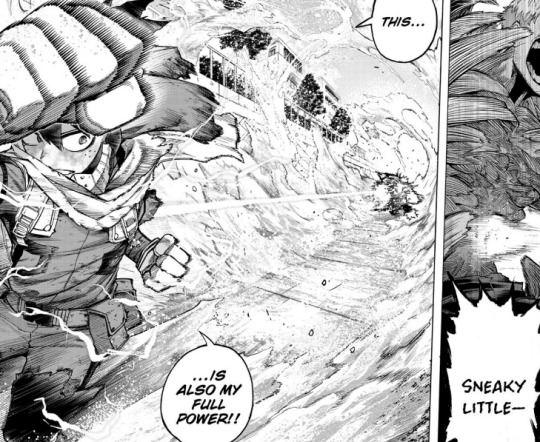
Well, if he’s failed in his goal of understanding a villain then does the story call him out on his failure? Does Deku face any sort of narrative consequence for that failure? Is he framed negatively for failing to understand Muscle, the same way that Judai is framed for abandoning Yubel? Nope. Deku doesn’t express any frustration at all over is inability to reason with Muscle. There’s also no negative consequence for Deku just choosing to punch muscle, it turns out that there was no reasoning with Muscle and some people are just bad eggs so Deku was right. It’s okay for characters to fail, but if a character fails and it’s not framed by the story as a failure then the writing itself as failed. Why even bother to include this scene in the first place if it doesn’t advance Deku’s character in any way? This scene in spite of showing Deku failing to understand someone actively paints Deku in a positive light, because of how much stronger he is ow that he can OHKO a guy that gave him trouble all the way back in the camp arc.
This scene doesn’t tell anything about Deku as a character, it just makes him look cool. In fact that’s precisely the problem, Deku isn’t adequately challenged as a character, because he’s never allowed to fail. Even when he does obviously fail at the things the narrative set out for him to do, he’s never challenged on those failures, because the priority isn’t to make Deku grow, it’s to make Deku look good. As I said before, Judai is the hero because he’s the weakest. Deku is the hero because he’s the strongest. Well, next a big flaw on Deku’s part is that he worshippd the same heroes that were making the world corrupt. Heroes like Endeavor who created people like Dabi. So, does Deku take action to either criticize the older generation of heroes, or separate himself from them in order to try to be better than them? Nope, he teams up with them. Not only that, Deku can’t do something as simple as tell Gran Torino out loud about his plans to save Shigaraki. If Deku feels that Shigaraki is worthy of salvation then he should at least try to make an argument here about his ideal of saving others.
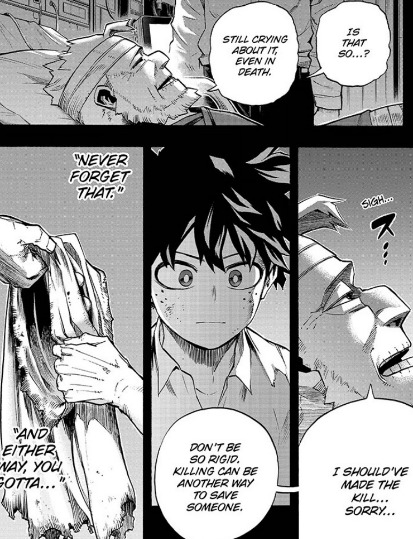
Now here’s the thing, if Deku hadn’t directly looked at the camera and told us he wanted to save Shgiaraki, would we be able to deduce his intentions from his actions? If you took away all of Deku’s internal monologue, and just showed him punching Muscular and saying nothing when Gran Torino says he may have no choice but to kill Shigaraki would anything about Deku’s actions indicate that he wants to save Shigaraki? Let me use avatar the last airbender as a positive example for a moment. People say that Aang’s desire to spare Ozai’s life comes out of left field, but like if you analyze Aang as a character down to their bending, and the way they react in situations they always prefer de-escalation, or taking a third option as opposed to confronting things head on. It’s literally why Toph says Aang has trouble learning earth bending, because as an airbender, he always tries to look for some other way to solve the problem, instead of a direct confrontation with force. As early as season one, Aang tells Zuko someone who has tried to kill him several times that he was friends with someone from the fire nation one hundred years ago and in a different situation they could be friends. Aang’s desire to save the Firelord may not have been told to us until the last possible minute, but Aang’s aversion to violence has always been a part of his character from the beginning. However, Deku never shows any similar aversion to violence. There’s basically no example where he ever tries to de-escalate a situation, or he avoids a conflict by seeking a third option.
Anyway, let’s move onto the next example. In the confrontation where Lady Nagant fights Deku, when Deku learns the fact that the heroes were employing government hitmen to attack people for uhh… exercising free speech does Deku give any reaction to this information? When Lady Nagant says that Deku is only going to bring back the status quo, does he show her any meaningful evidence that he won’t do that.
Deku’s response is because the world is so grey, he needs to extend a helping hand to others. Which you know what thay could be a response. Deku saying that his response to the corruption of the hero world is that he now understands that society led some people down the wrong path, so his way of addressing the wrongs of that society is lending a helping hand to as many people as possible even people he used to think was irredeemable.
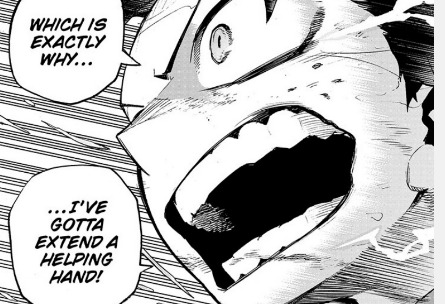
I will give Deku the benefit of the doubt, I think this is an acceptable answer. I can’t save everyone, but that’s not going to stop me from trying to save as many people as possible and maybe I can save people who were this society’s victims on the way too. However, does Deku demonstrate his resolve to extend a helping hand in any meaningful way.
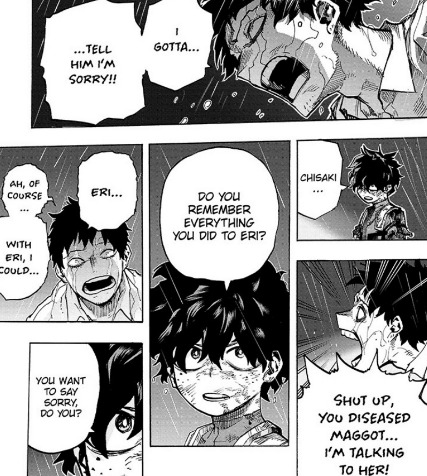
Deku is met with an armless, insane Overhaul who’s begging for someone to help heal his father figure in the Yakuza from his coma. This isn’t like Muscular who insists that there’s no helping him, Deku is met face by face with someone asking him for help. Deku’s gotta extend a helping arm whenever he can, because he knows some people were abandoned and led astray by this society… Unless that person is someone he doesn’t like personally. At which point he only helps them on a conditional basis. We are told Deku will save anyone and everyone, but Deku is met face to face with an armless man who is begging for help and Deku’s does nothing to help him. Deku’s not criticized for refusing to help overhaul either, it’s never brought up again. When Deku begins to experience a mental breakdown because of all the people he’s trying to help in the Dark Deku arc, we are told this is the result of Deku trying to save everyone, but we do not see Deku attempting to save a single villain after Muscular and Nagant.
He exhausts himself beating up villains that AFO sends after him, and only helping innocent civilians. Which would be fine if this arc were about how Deku is running away from his real responsibilities the same way that Judai was running, but that’s not what we’re being told. We are told that this is all part of an arc of Deku learning to understand villains and be a hero.
Deku is asked “Can you save Shigaraki?” by the story, but Deku never at any point has to deliberate on that question. Judai doesn’t deliberate on that question either, but him choosing not to think about things and stay ignorant is the point.
It’s actually fine to make Deku stagnate as a character. It’s fine to have him take the easy way out by just punching villains and giving up on them after one conversation. It’s fine for him to be empathetic to other people’s suffering, or even self-righteous. It’s fine for him to be ignorant.
He could be all of those things if it was a part of a narrative teaching him to unlearn his behavior. In fact the narrative might have been better if Deku started out by saying he didn’t want to save Shigaraki, that there was no choice but to kill him, because then at least his actions would be consistent with his words. Then his lack of empathy and his tendency to resort to violently beating up villains instead of avoiding violence would be character flaws he could work on. Deku however, is presented to us as this empathic hero who is always willing to give others a second chance though he never actually sticks his neck out in order to do so. Continuing on with our slow crawl through MHA, one of Deku’s friends is revealed as the traitor. Deku has a heartwarming scene fo saying that Aoyama can still be a hero, but look at his actions. He lets the adults in the room physically tie Aoyama in a straightjacket and imprison him, for the crime of… doing bad things while he was in a hostage situation. Apparently, if a bank teller helps the bank robber by giving them money when the robber has a gun to his head, the swat team should just snipe the bank teller. Not only does he not defend Aoyama against the adults, or stand up for him, or tell the adults they’re wrong to treat Aoyama a clear cut victim who had a gun to his head and was bing held hostage like he’s a villain - he also lets the adults use Aoyama an innocent victim as bait in order to lure out AFO. Deku tells Aoyama he can still be a hero, but he doesn’t defend Aoyama as a victim of being taken hostage, nor does he stop the adults from further taking advantage of him and throwing him right into danger. Some people are just led the wrong way that’s why they need to be extended a helping hand, but fuck Aoyama I guess. He needs to earn the right to be sympathized with by physically putting his life in danger.
Deku can’t even go out of his way to save a friend who he’s known for the better part of a year, when that friend is a complex victim forced to do bad things.
Then Deku and Uraraka have a conversation where they both, kind of ruminate on the idea that maybe the villains are human beings who are worthy of sympathy.
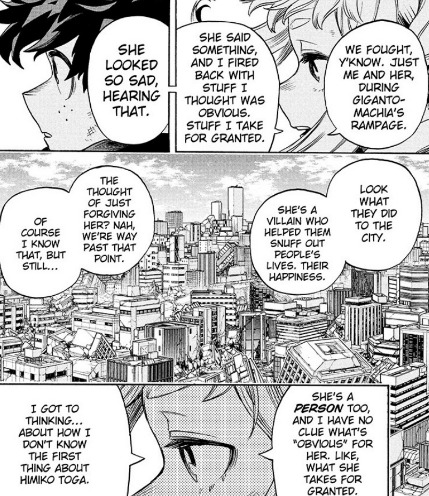
In fact Uraraka is actively trying to dehumanize Toga by looking at the destroyed city, so she won't have to think of Togaas a person.
The language here is also a major fault of this arc. It focuses far too hard on “forgiveness” over and over again. As I said before, saving Shigaraki isn’t about Shigaraki at all, it’s about Deku, and how he wants to use his power as a hero. Deku has even stated himself that he doesn’t believe that OFA is a power that should be used for killing people. So why does whether Toga or Shigaraki are forgivable or not even matter? It’s the same with Deku refusing Overhaul any sympathy. If he’s so morally opposed to abusers, then why does he work with Endeavor and defend him at every visible opportunity, even in front of his victims? Whether or not Deku can forgive Shigaraki doesn’t matter, because Deku is not the moral arbitrator or right and wrong. In fact Deku doesn’t even have any morals, so how is this a moral debate? Is there any point where Deku gives a clear definition of what he thinks right and wrong is? Does he quot Immanuel Kant to the audience?
Batman doesn’t kill people, not because he thinks that every last person on earth can be saved, but because Bruce Wayne an incredibly rich white man thinks that maybe he shouldn’t have the authority to decide who lives and who dies. When Bruce doesn’t kill the joker, it doesn’t mean he thinks the Jokers actions are forgivable, it’s because Bruce thinks it’s not his place to determine whether someone has the right to live.
The whole conflict that MHA presents us is that heroes pick and choose who to save, and only save the ones they deem as innocent. So, how does Deku saying repeatedly they can’t forgive Shigaraki contribute to that theme in any way? In fact by focusing on forgiveness, rather than whether or not he personally has the right to pick and choose who lives and who dies Deku is ignoring the elephant in the room. The question isn’t about whether Shigaraki’s redeemable or if his deeds should ever be forgiven. The question is whether Deku has the right to decide who gets saved and who doesn’t.
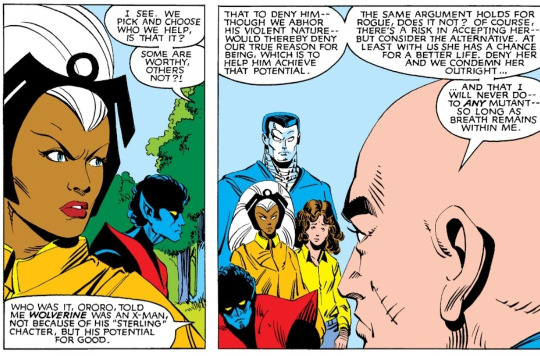
We are told that Deku as a character is someone who wants to save everyone no matter what, so Deku shouldn’t be focusing on whether or not Shigaraki is worthy of forgiveness, he should be making an idealistic argument like Xavier does in this panel. Why doesn’t Deku talk out loud with Uraraka on how he believes his power is for saving others, and not killing? If he’s meant to represent some idealistic hero, then why doesn’t he even talk about his ideals? Why don’t I as the reader know what those ideals are?
I think Xavier’s ideals of forcing the X-men to provide a good example to the mutant community, in order to try to earn the respect of other human beings is wrong, but at least he has ideals. He tries to inspire the other people around him to live up to those ideals. The story can criticize him for his ideals and point out how they’re wrong, while it can also uplift parts of his idelogy like where he believes there are no evil mutants. Deku has a chance to do the same to Uraraka, to tell her clearly, “I don’t think we as heroes have the right to pick and choose who we help…?” but he waffles. Not only does he waffle, but this moment is meant to be read as an indication that both Deku and Uraraka are sympathetic individuals who want to save their villains. They are supposed to look good and idealistic here and they don’t. For Deku it just seems like a repeat of his behavior with Overhaul. The only villains that are worthy of sympathy, are the ones that he personally decides are forgivable.
The story isn’t about whether or not it’s moral to save someone who’s killed as many as Shigaraki has. The story never seriously discusses any sort of complex morality or moral philosophy. Once again to bring up avatar, yes you can argue Aang sparing the life of a war crimminal is bad, but Aang mentions on multiple occasions that he wants to retain the cultural values of the airbending people. Aang has a morality, a consistent morality, it might not be a morality you personally agree with but at least he has one. Deku hates abusers, unless he’s next to Endeavor then he thinks abusers should be given the chance to atone. Deku doesn’t believe that One for All is a power for killing, but he never stands up to any of the adults who are blatantly trying to kill Shigaraki, he doesn’t even express out loud to Uraraka that he doesn’t think heroes have the right to decide who lives and who dies. In fact he’s given the perfect opportunity to, when Hawks kills a villain and it’s broadcast live on the news in font of everyone, but Deku never has anything to say about that. The reason Deku and Uraraka both put such an emphasis on “forgiving” their villains has nothing to do with the story itself. It’s because the author Horikoshi, is afraid that some people will misinterpret his story as saying that he actually thinks that saving a villain like Shigaraki means that he condones mass murder, so he has to have the characters talk about not forgiving Shigaraki.
Judai doesn’t have any consistent morals either, but once again that’s the point and something the story relentlessly calls him out on.
Cobra: Fortune would never smile on a fool like you who fights while prattling on about enjoying duels. Cobra: You are certainly a talented duelist. But you have one fatal flaw. Judai: A fatal flaw? Cobra: Yes, your duels are superficial. Someone who fights with nothing on his shoulders, cannot recover once he loses his enjoyment. What a duelist carries on his shoulders will become the power that supports him when he's up against the wall! Cobra: But you have nothing like that! Those who go through life without anything like that cannot possibly seize victory. Cobra: But I know that nothing I say will resonate with you... because you have nothing to lose but the match. Judai: I... Cobra: Afraid aren't you? Right now, you have nothing to support you.
Judai’s regularly called out for his superficiality. Judai is only a hero because he’s strong and wins fight, he doesn’t feel any responsibility towards other people, and in fact he loathes having to feel responsible for others. Judai isn’t just naive, he deliberately chooses to remain ignorant. Since he’s ignorant of his own faults, he makes awful decisions when it comes time for him to lead, and his friends die because of choices he made. We are told that Deku doesn’t want to remain ignorant, that he wants to understand villains, but Deku’s actual actions are him continuing to ignore society’s ills and the suffering of victims. In fact if you take away Deku’s internal monologue and the narration, Deku’s actions almost exactly mirror Judai’s.
Deku is just as superficial as Judai, and he also doesn't want to spend any time thinking about what kind of hero he wants to be, but the narrative never punishes him for it.
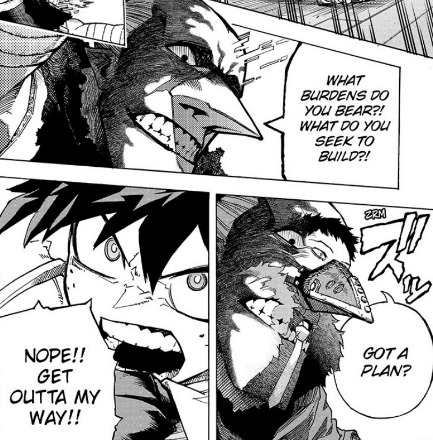
Judai is asked what burdens he has to bear and he has to meaningfull answer that question, Deku is allowed to get away with not having to think about anything. Deku remains superficial. Both Judai and Deku spend the entire arc running away from their villain rather than confronting them in any meaningful way. They both never express out loud any sympathy for their villain, or try to empathize. THey both never step down from the role of hero, and only confront their villain as a hero, because they don’t want to think about themselves as complicit or in the wrong. Shigaraki and Deku’s final confrontation mirrors Judai and Yubel’s but without the same clear framing. THe entire time Yubel is trying to get Judai to empathize with them, and Judai only responds with physical violence, because they don’t want to stop being the hero and because they can’t see Yubel as anything other than the villain. As soon as Deku arrives on the battlefield (by the way everyone else and their mom pointed this out, but Deku who doesn’t think OFA is a power for killing, is completely okay with a plan called the “Sky coffin plan” where every other hero was clearly trying to murder Shigaraki).
When Deku arrives he asks if Shigaraki is still in there, but he doesn’t do anything to try to reach Shigaraki, he jumps right to punching him. In fact he never tries anything besides punching him as hard as possible. How is punching Shigaraki with the force of a thousand suns saving him exactly? How is that different from how he tried to defeat Shigaraki the last war arc, before he saw the image of the crying child that made him want to try a different approach in saving Shigaraki? In Judai’s final fight with Yubel, it’s made explicitly clear that Judai is not trying to save Yubel, and that’s a fault on his part. In fact Judai gives the traditional “I have friends, and you don’t” speech to Yubel but it’s a subversion of how that speech is usually used. Usually that speech is used to show that the protagonist won because of they valued friendship,while the villain treated their friends poorly and only cared about power. However, it’s ironic in this case because Judai got all of his friends killed. Judai treats his friends like garbage. This speech isn’t used to show that Judai is winning because he values his friends more than Yubel does, it shows that Judai is a hypocrite, playing the hero in this situation where they are just as bad as Yubel. Judai’s not morally superior, he’s just lucky that he has good friends. Friends that were willing to save him. The only connection Yubel has to anyone else, Yubel’s only friend is Judai and Judai is a shit friend.
In fact, Mirio tries to give a version of the “You don’t have any friends” speech to Shigarkai, only for Shigaraki to get mad and tell Mirio that he does have friends and people he wants to protect.
This fact is also something that is blatantly ignored by Deku, even though Mirio tells him about it… even though we are told that Deku is trying his best to see the humanity in Shigaraki.
Judai blatantly admits they’re trying to kill Yubel. Which makes them a worse person, but a better character than Deku, because their actions are clearly framed by the narrative and consistent.
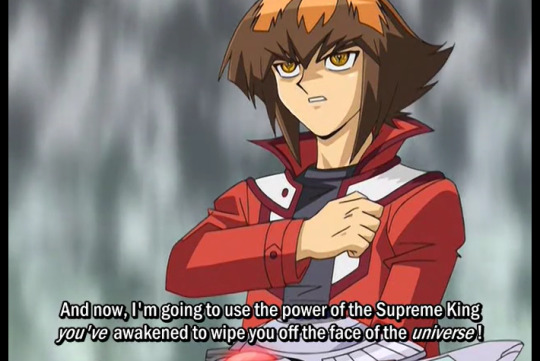
On the other hand we are told that Deku doesn’t want to kill Shigaraki, and yet everything Deku does makes it look like he’s just trying to kill Shigaraki and put him out of its misery. If we didn’t have Deku stating out loud that he wants to save Shigaraki and wants to see him as a human, there’d be nothing in his actions to indicate that he’s trying to avoid killing Shigaraki. Deku says he can’t pretend he didn’t see Shigaraki crying, but like, does he ever hesitate to punch Shigaraki, does he ever think that causing Shigaraki more harm is wrong when he’s already suffered so much? Deku says that Shigaraki is a person but does he treat him like a person? Does he try to talk to him like a person? To use avatar again, Aang does talk to Zuko pretty early on. Deku doesn’t even give the classic “We could have been friends under different circumstances” speech. When Shigaraki resists Deku’s attempts to see him as a person or emapthize with him, Deku’s response is to just resort to punching harder.
Which is in effect the same thing Judai does to Yubel, just kill them as a villain so they don’t hurt anybody else, but framed in an entirely different light. Judai is shown to be ruthless, and cold in his attempt to only settle the conflict with Yubel by violently putting them down. On the other hand we’re being told that Deku is compassionate and empathic while he punches Shigaraki with the force of a thousand suns.
There’s another eerie similarity between both of these final confrontations. At the climax of the confrontation, both Judai and Deku have a psychic vision where they see events from Yubel and Shigaraki’s childhood. This vision is supposed to help both characters understand the good in the villain they’re facing.
Let’s see the contents of this vision and how the visions change each character. Judai is shown a vision of his past life where Yubel sacrifices their entire body, and even their humanity to go through painful surgery to turn into an ugly dragon, all for the sake of protecting Judai in a previous life.
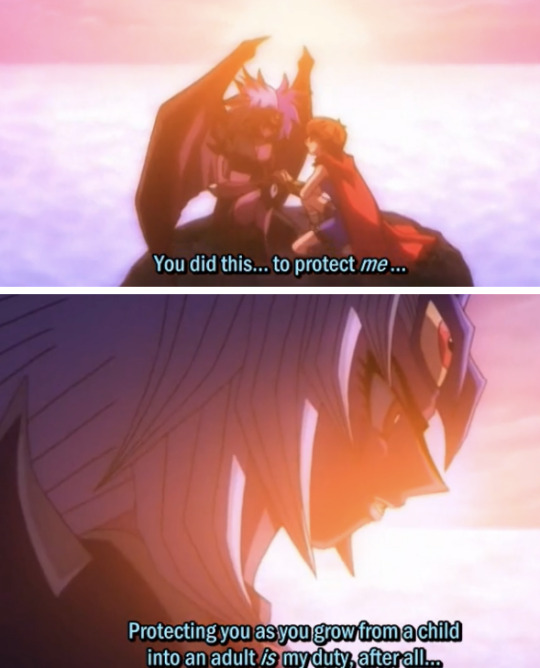
Judai is then forced to witness the good side of Yubel they’ve been ignoring all along to paint them as a villain. Yubel is simultaneously extremely selfish and willing to hurt people Judai cares about, but they’re also extremely selfless and will do anything to protect Judai and have made great sacrifices in the past for Judai’s sake. Deku gives lip service to not ignoring the humanity in Shigaraki, but Judai is literally forced to acknowledge the humanity in Yubel. Not only that, but Judai changes his behavior immediately after learning this new information. After seing the sacrifice that Yubel made for him in the past, Judai responds with a sacrifice of his own. A sacrifice that perfectly mirrors the sacrifice that Yubel once made for him. Yubel gave up their humanity for Judai, so Judai fuses his spirit to Yubel’s, becoming a human / spirit hybrid so Yubel no longer has to be alone.
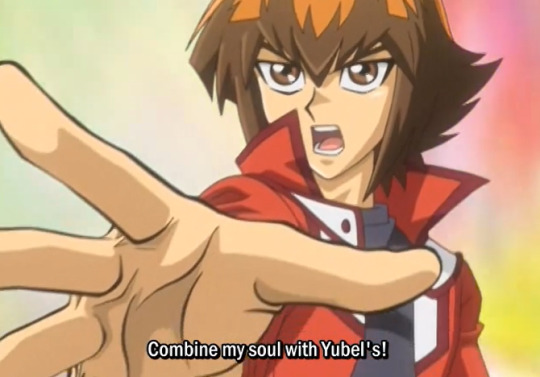
Judai also doesn’t just fuse their soul with Yubel’s in order to stop Yubel from destroying everything, it’s because both of them at this point need to atone together, and Judai is fulfilling his responsibility of watching over his friend until the end to prove that you care about them - as he said to Sho. Judai’s also fulfilling Johan’s dream of helping repair the bonds between spirits and humans, by reconciling with Yubel and repairing their bond. It’s also Judai atoning for his previous behavior of abandoning Yubel, by choosing to stay alongside them as they both atone together. Deku does sacrifice OFA during the fight against Shigaraki, but their sacrifice isn’t to help Shigaraki, but rather doing psychic damage to Shigaraki by using OFA is the only way to defeat them. He transfers OFA in order to break Shigaraki’s brain so he’ll stop reissting and Deku can beat him down. Judai fuses their soul together with Yubel out of empathy and a responsibility they feel to help their friend fater abandoning them, Deku transfers One for All to Shigaraki in order to hurt him and make him easier to punch. It's funny that Deku doesn't travel to Shigaraki's mind to learn more about him, but instead with the specific intent of harming him.
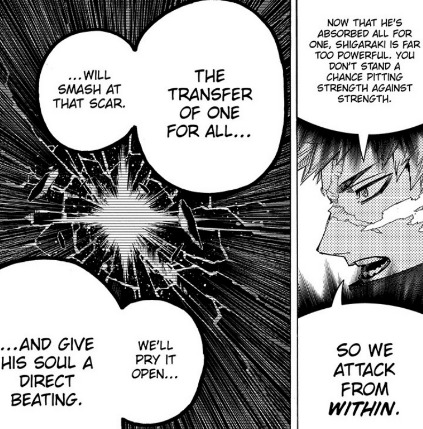
Once he's inside Shigaraki's mind, he doesn't take time to reflect on how Shigaraki used to stand up for bullied kids, or how he wants to be a hero to villains because no one else will stick up for the outcasts in society. No, he only care about Shigaraki when he takes the form of a child crying for help.
In the aftermath of the psychic vision Deku’s behavior doesn’t change towards Shigaraki in any way either. You could say he sacrificed his own arms in order to try to comfort Shigaraki within the depths of his own mind - but that’s not a real sacrifice either because his arms immediately come back. When Judai learns about the sacrifice that Yubel made in a previous life towards him, he stops seeing Yubel as an enemy and finds a way to resolve things peacefully between them. When Deku lanterns that Shigaraki’s a victim of All for One, and that his entire life was a lie, when he sees Shigaraki’s suffering first hand does his beavior twoards Shigaraki change in any way?
When he sees Afo has taken over Shigaraki’s body again, does he try to shout for Shigaraki, to tell Shigaraki to fight from the inside, to reassure Shigaraki that he’s still in there that there’s still good in him? Nope. He just punches Shigaraki some more.
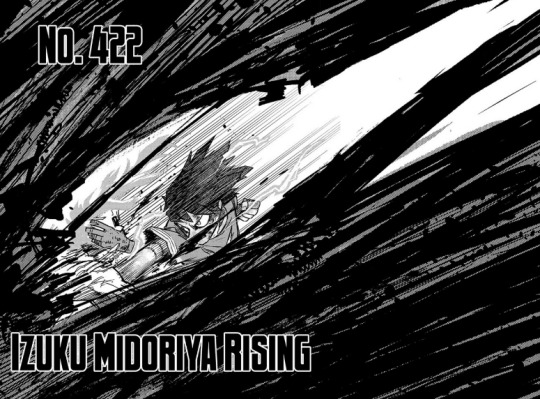
What Deku needed to tell Shigaraki is so obviously set up by the narrative too. Shigaraki wanted just one person in that house to tell him he could be a hero. Deku wanted his mother to tell him he could be a hero if he was quirkless. Deku sees that Shigaraki started out as a boy who wanted to be a hero, and who was manipulated into being a villain but does he try to appeal to the boy inside of Shigaraki by telling him he can still be a hero? Does he now see the good in Shigaraki? Nope, he just tries to kill him by punching him really hard.
I purposefully chose the images for the banner of this post, because it shows how differently MHA and GX treated its villains in the end. Yubel is embraced by Judai in the end, Shigaraki evaporates into dust.
"Judai, now that our souls have become one we will never be separated again. I have now been filled with your love and power. Let us fight together, against the wave of light leading this universe to destruction!"
Shigaraki could so easily have been given the love and empathy that Yubel was shown, but instead their life ends with no show of empathy from Deku, and with them dying believing that their long life of tragedy meant nothing in the end. Shigaraki realizes he's a crying kid, but he's never comforted.
Shigaraki: I only stole my body back from Master, and I didn't destroy anything. "In the end, I was just as you said... A crying kid, huh?"
Yubel is embraced and comforted, Shigaraki disintegrates into nothing.
One of these stories is apparently an optimistic story about heroes saving people, but it ends with the lifelong victim being killed in the most nihilistic manner possible, never receiving comfort, and never achieving anything with his long life.
The other story is a silly anime about card games, shows that when people are alone and suffering they can lash out and do terrible things. That all people are weak especially when they're alone, but the solution isn't to abandon them, or condemn them for their faults, but to believe in them and help uplift them the same way that Judai decides to uplift Yubel so they can atone together.
Which is why Deku gets an F in being a hero. Go directly to summer school. Do not pass Go. Do not collect $100.
#mha meta#ygo meta#mha 423#bnha 423#mha 423 spoilers#bnha 423 spoilers#izuku midoriya#deku#shigaraki tomura#tenko shimura#judai yuki#yubel#soulshipping#yu gi oh gx#yu gi oh
712 notes
·
View notes
Text
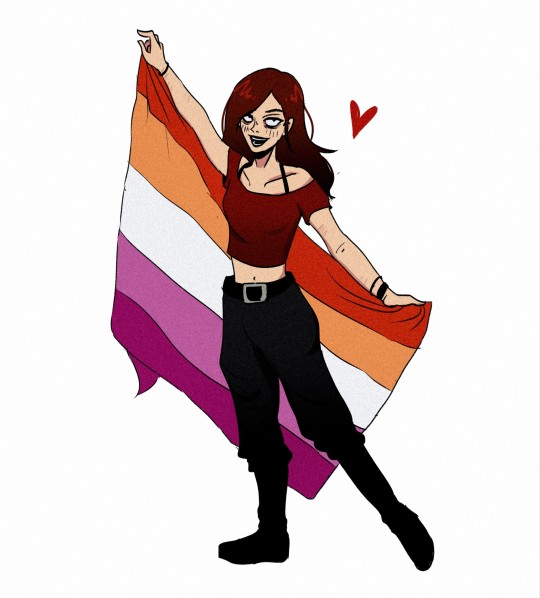
🫶
#been wanting to draw this since a few days ago hhhhh#i have a headache so i drew this very fast but here ya go lesbimanda nation#saw#sawposting#saw fanart#saw iii#amanda young#lynnmanda#shotgunshipping#soulshipping#wlw#sapphic#lesbian#motherdanger art
402 notes
·
View notes
Text

how I long to be your dog
244 notes
·
View notes
Text
How to say "I love you" in Yu-Gi-Oh: punishing in cruel and extravagant ways the real or perceived offenses directed at your literal soulmate (who may not agree with your actions or be completely unaware of them).
#puzzleshipping#soulshipping#yugioh#yugioh gx#this is mainly about those ships however you could also fill in your interpretation of#tendershipping#and maybe even#eclipseshipping#i haven't#watched beyond gx yet so i don't know if there are any more cases of this#atem x yugi#yubel x judai#atem#yami yugi#yugi mutou#judai yuki#yubel#ryou bakura#yami bakura#malik ishtar#yami malik#bakubaku#malikmalik
85 notes
·
View notes
Text

Commission that I did for my best friend @ottercopter!!! I also made it into a badge!

#yugioh gx#ygo gx#judai yuki#jaden yuki#yubel#soulshipping#spiritshipping#yeah yeah i know in theory its not spirit but its johans body so whatever okay im sorry
110 notes
·
View notes
Text
I wanted to share my favorite yugioh art which makes me insane
3 part wordless soulshipping comic by 拖狗 (links below)






Read the whole thing on their pixiv:
Part 1 Part 2 Part 3
#every single panel kills me#the linework. the expressions.#the visual storytelling. god.#judai yuki#jaden yuki#yubel#soulshipping#yugioh gx#gx#ygo
47 notes
·
View notes
Text

I think a lot about Yugioh GX episode 155 (source)
#yugioh series#yugioh gx#pics#memes#edits#yubel#judai yuki#soulshipping#if anyone points out the urls are still the same person:#that's intentional
70 notes
·
View notes
Photo

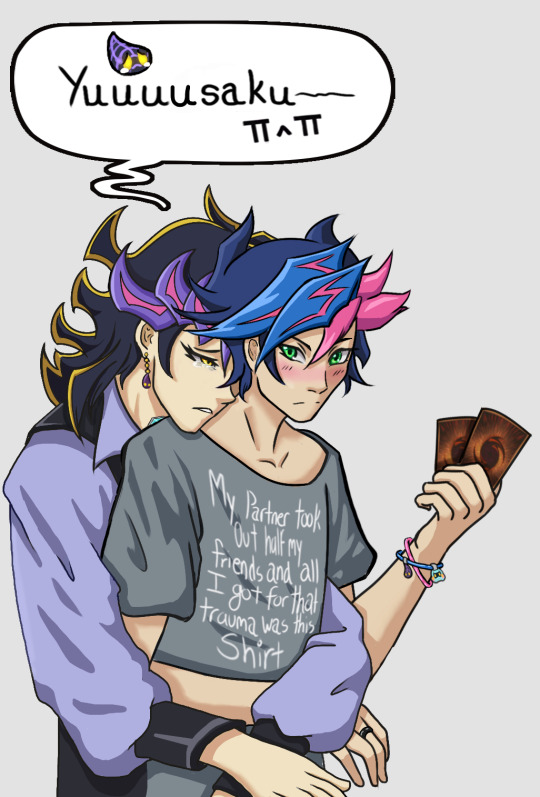
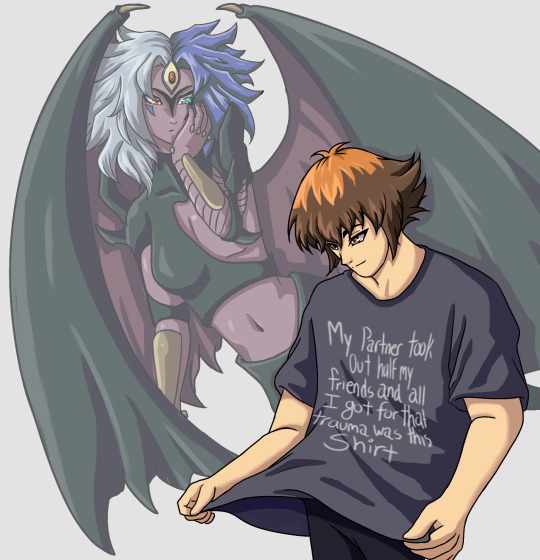
In honor of pride month I’m out here not only supporting YuGiOh characters’ gay rights but also their gay wrongs.
#YGO says you can have queer characters but only if you pay the S3 trauma tax#the similarities between Jaden/Juudai and Yusaku will never not amuse me#all yall writing fics with them talking about their partners are so valid#Like Yes we both have clingy overpowered soulmates#who we challenged to death matches where soul fusing was an option#soulshipping#aiballshipping#yugioh#ygo#ai vrains#soltis ai#yubel yugioh#jaden yuki#judai yuki#yusaku fujiki#aiyusa#yugioh vrains#yugioh gx#my art
422 notes
·
View notes
Text
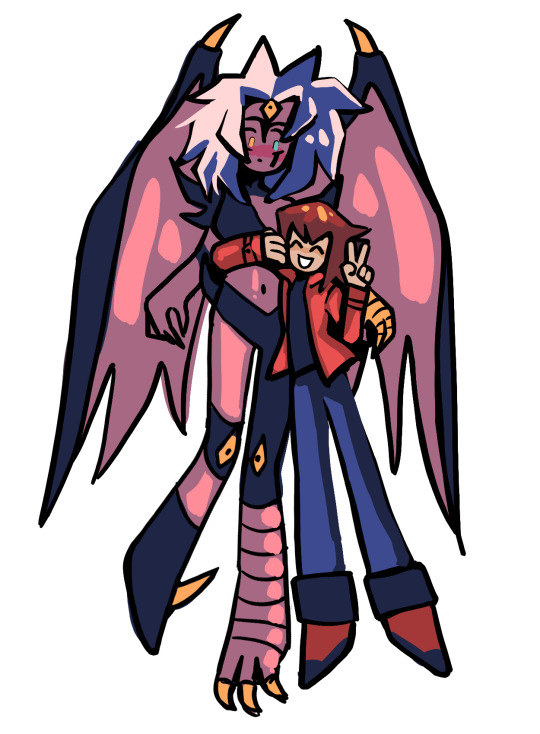
384 notes
·
View notes
Text
favorite saw pairings lol
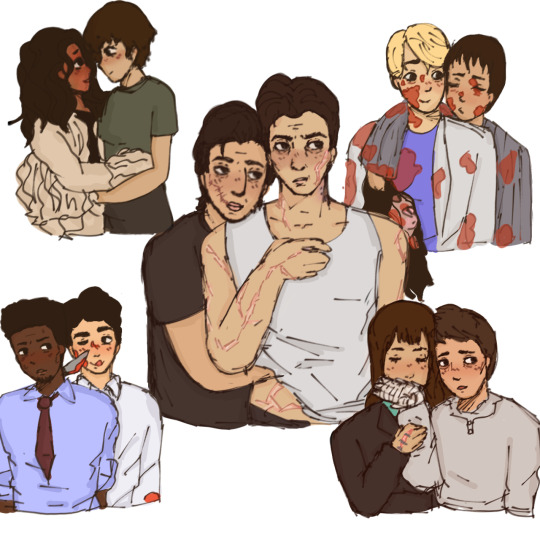

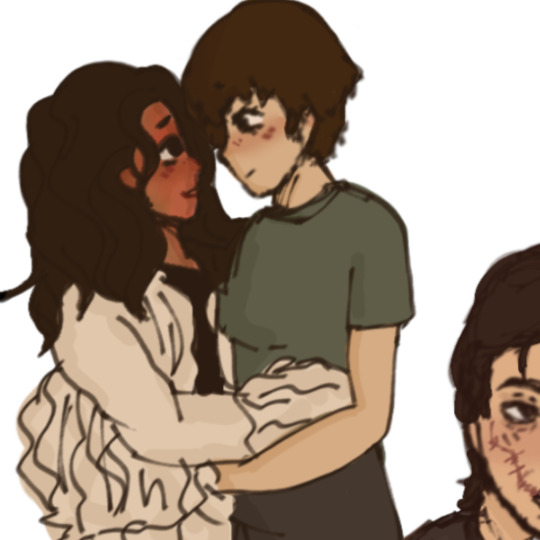
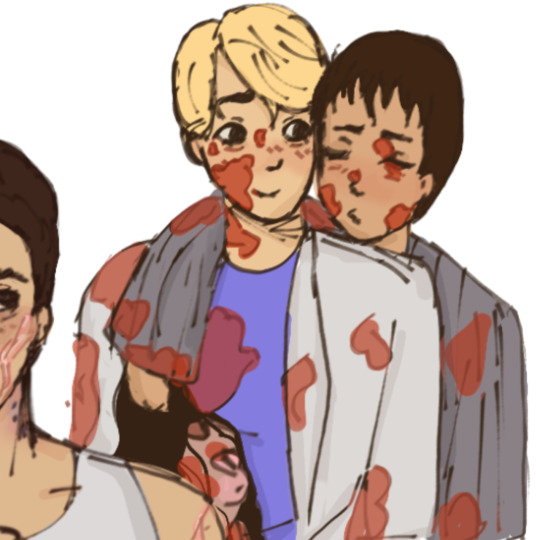


This took FOREVER HELP
#fanart#chainshipping#coffinshipping#pintshipping#hammershipping#radiationshipping#soulshipping#spiralshipping#zeke banks#saw zeke#saw William#william schenk#saw William schenk#mark hoffman#saw mark Hoffman#saw hoffman#saw strahm#peter strahm#adam faulkner stanheight#adam stanheight#saw adam#lawrence gordon#saw lawrence#Gabriela saw#saw Gabriela#Amanda young#brit stevenson#mallick scott#saw#sawposting
195 notes
·
View notes
Text
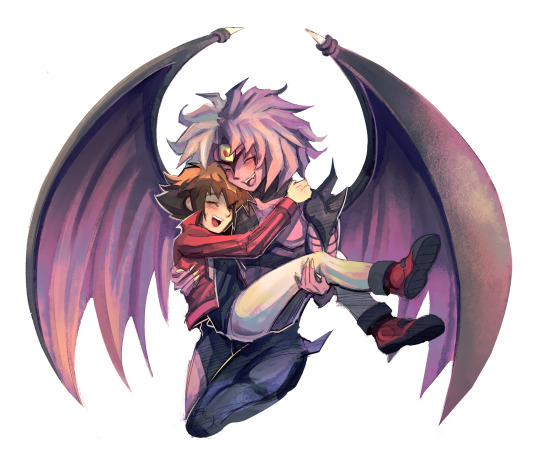
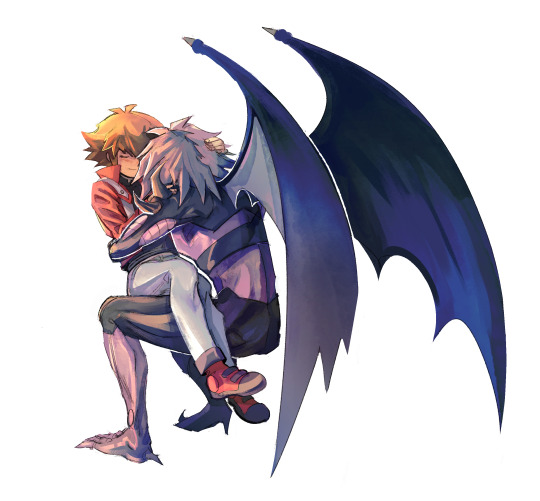
i love judai and his big beautiful girlboyfriend..
#their love is so beautiful... it makes me cry..#yubel#judai yuki#jaden yuki#yugioh gx#ygo gx#soulshipping
562 notes
·
View notes
Text


DUEL VS. DUEL: Yubel and Judai vs Ai and Playmaker
If you haven't noticed YGO! often recycles different characters and plot ideas throughout its various spinoffs. There's usually a rival whose ace monster is a dragon, a best friend character to support the main character, there's almost always a guy like Bakura who has several things wrong with him. This isn't a criticism, I actually love the way that each spinoff builds off of all the other series while also remaining its own thing. There's a lot of meaning you can decipher from analyzing the intentional callbacks the authors put in to previous series so that's what we're going to do today.
Both GX and Vrains feature a third season where the protagonist's partner character becomes the main antagonist for the entire season, and manages to pick off the protagonist's friends one by one until they're all alone with the protag for the final duel. Both of these characters, Yubel and Ai aren't motivated by hate but rather a twisted form of love and the parallels between these two duels don't stop there.
Yubel and Yusaku: Love vs. Ai

The partner character appears in almost every YGO! series with the exception of 5DS and Sevens. It began with Yami Yugi, a second personality created inside Yugi who played took over and played games in Yugi's place and cursed everyone who offended him only to eventually build a partnership with Yugi that lasted for most of the series until Atem reclaimed his name and memories and became his own person again.
These partner characters usually assist in duels, and are either another personality existing inside the protagonist, or if they're external like Astral or Ai they still share a special link with the protagonist.
Yubel and Ai are unique because they are both partner characters who turn into major antagonists. They don't just share the role of antagonists there's also several similarities between the two of them, from motivation, their connection to the protagonist, and both characters being built around the concept of love. This is probably intentional because the scenario writer for all of Vrains also worked on large parts of GX and was the main scenario writer for Season 4.
To introduce both characters, Yubel is a Duel Spirit. They were originally a human child named Yubel who was the closest friend of the boy who would eventually grow up to be the Supreme King and reincarnate in the modern day as Judai Yuki. Yubel gave up their humanity and in a painful surgery became a hideous dragon with an impenetrable body in order to protect Judai.

Afterwards the boy who would eventually become the Supreme King swore eternal love to Yubel. Yubel's devotion followed Judai into the next life, where because Yubel gave up their humanity they reincarnated as a card spirit instead that only Judai could see. They used their considerable power to protect Judai from anyone they considered a threat, including other neighborhood kids who beat him in card games. Judai as a result became completely isolated. Which Yubel didn't mind because Judai was their entire world and they believed they should have been enough for Judai.
Judai decided to send Yubel's card away into space in the hopes that the space rays would calm Yubel's troubled soul, but instead Yubel became corrupted by a cosmic force known as THE LIGHT OF DESTRUCTION. Yubel endured ten years of torture and agony all along. At first they called out to Judai in his dreams, but his parents eventually forced Judai to go through a procedure that made him forget all memories of Yubel.
Alone and forgotten Yubel crashes down to earth and is torn to pieces. As an arm they parasitize several people until they gain enough power to reconstitute their body, and then dragon Judai and all his friends into another dimmension all as a part of their grand scheme to finally reunite with Judai and awaken his memories of the Supreme King.


Even though they were hurt by Judai, Yubel isn't motivated by revenge, but by love and a desire to be together with Judai and secure all of Judai's love for themselves. Yubel's twisted definition of love was formed when after crying for help one final time, they snapped and told themselves a lie in order to keep going. That ignoring Yubel, making them suffer, leaving them all alone it was just the way that Judai expressed his love. Yubel then becomes dedicated to showing that love in return and effectively dragging Judai down to their level.
Yubel: I was suffering as you came to forget about me… Yubel: It burns… It hurts…It’s killing me. But why? I love him so much. Why is Judai treating me like this? Yubel: And then it hit me. This is just a form of Judai’s love. Judai is hurting me and making me suffer because of his love for me. But you see, I couldn’t possibly forget about you in the time i’ve suffered. Yubel: So when I solved the riddle that you posed to me, I was delighted. And that fueled my decision. I would try to fill the entire twelve dimmensions with my love for you. Yubel: And once I did you would have to recognize my love for you, wouldn’t you?
Ai is also a character that's connected to Yusaku's childhood. Ai is an ignis, and artificial intelligence that was created by basically torturing six children by forcing them to duel over and over again and then scanning their brains and modeling six different AI off of the data.
The shadow ignis or AI quite literally came from Yusaku's brain, even though they don't meet until much later on in life. From the onset there's a lot of differences between Ai and Yubel's role as partners. Ai is Yusaku's partner for most of the series, and is effectively introduced as a stranger and has to build a bond fo trust with Yusaku over the first two seasons.
Whereas Yubel was Judai's best friend and favorite monster in childhood, but Judai has forgotten about Yubel in the first two seasons and when Yubel finally does appear again it's as an enemy. The bond between Yusaku and Ai forms and then falls apart, whereas both Yubel and Judai start out with their bond completely broken and over the course of season three they reunite and come back together.
Ai is motivated by first his own survival, and second the survival of all the other ignis who are currently being hunted by several human corporations, a group of hackers known as the knights of Hanoi, and one Ignis themselves known as Lightning who turned traitor to the other Ignis. Yusaki and Ai's shared goal is to find a way for the Ignis and Humans to co-exist without one of them trying to pre-emptively wipe out the other because of the danger both of them pose to each other.
Over the course of the story though, as one by one Ai loses his friends in the fellow Ignis who either die or are absorbed, he comes to obsess over Yusaku as his one remaining friend. Yubel and Judai's feelings for one another are a holdover from a previous lifetime they become estranged and reunite again, whereas Ai comes to love and obsess over Yusaku similiarly to Yubel does and it's precisely because of those obsessive and overprotective feelings he decides to terminate their relationship permanently.
Ai enacts a plan similiar to Yubel's to destroy Yusaku's friends one by one all while threatening the entire world. Yubel sought to fuse the dimmensions together, while AI wants to start the inevitable fight between the Ignis and Humanity on his terms.
While their role in the story and characters are similar, they're also contrasting opposites in many ways. Yubel started out as a human and gave up their humanity to become a duel spirit. Ai started out as an artificial intelligence, he thinks as an artificial intelligence who has trouble understanding humans, and while he becomes more humanlike all the time he's eventually hampered by his inability to think like a human. Yubel is also much older than Ai having lived two lifetimes with memories of both, whereas Ai is essentially a child, a fledgling sentient being who still doesn't understand many things about the world.
Their different levels of maturity really show in their understanding of the world around them, or rather Ai's naivete and lack of understanding. Both characters are built around the concept of love, with love for the protagonist as their main motivation but Yubel while twisted demonstrates a deep understanding of love.
Yubel is able to see inside the hearts of people and uses their intimate knowledge of their inner darkness in order to twist people according to their own desires. Yubel's actually a deeply empathic character able to understand people's feelings sometimes better than they understand themselves, they just use that empathic understanding for evil.
While their understanding of love sounds insane at times they're also able to make deep observations about not only people's relationships to each other but the darker nature of love. As much as we shy away from the idea of hurting the ones we love on purpose, there's a seed of truth in the fact that whether intentionally or unintentionally being close to someone means you will hurt them. That pain is a natural part of love. She's also able to suss out the unhealthy love and devotion shared between Amon and Echo quickly.
Yubel: I get it now… You weren’t in love with Echo. Yubel: No. You may have loved her just enough to clear the conditions in place for you to control Exodia. Yubel: But then, you didn’t truly love each other. Yubel: You were only unfairly hurting her, while you would stay unharmed. Yubel: You wouldn’t suffer. You wouldn’t be in pain.
Yubel also ultimately seeks a love between equals. As much as they frame themselves as Judai's protector, what they want is for Judai to be dragged down to their level so Judai will finally understand them.
Their entire plan revolved around isolating Judai until Judai understood the pain of suffering ten years alone in space that Yubel went through. When Judai snaps and becomes the Supreme King taking a similiar dark turn to Yubel, Yubel turns out to be right in the end. By the time they've reunited both Judai and Yubel have done terrible things and hurt the people they loved.
Yubel: So when I solved the riddle that you posed to me, I was delighted. And that fueled my decision. I would try to fill the entire twelve dimmensions with my love for you. Yubel: And once I did you would have to recognize my love for you, wouldn’t you? Yubel: That is why I sought to fill all those linked to you - your world - with both sadness and anguish. Yubel: ANd my line of thinking wasn’t wrong. Yubel: I mean you are right before my eyes, Judai.
Yubel operates on a principle of empathy and understanding through shared suffering. Whereas, I would argue while Ai cares about Yusaku they are not particularly empathic nor do they understand Yusaku. This is because Ai is practically a newborn existence naive to the world, and also as a computer with a computer brain fundamentally thinks differently.



However, I'd also argue that Ai also doesn't really want to try to change their thinking to bridge the gap between humans an AI. In despair they've completely given up on trying to understand humans. They also on some level don't want to change, because they arrogantly assume they know what's best for both them and Yusaku.

Ai has given into despair from losing their loved ones and suffering isolation just like Yubel, but I think a key difference is that everything Yubel does no matter how twisted is a desperate attempt to reunite with Judai, to understand Judai and be understood by them. Whereas, Ai doesn't want to try anymore.
Ai: Back then I would have done anything to save my friends. Yusaku: There's nothing you could have done there was no other way. AI: I know that. [...] Yusaku: Ai, you have the power to change this. Yusaku: As a special ignis you have the power to live with humans. Find a way to backtrack from this. AI: You trying to pull me back? AI: Thank you Playmaker, but you don't understand. I learned when everyone was gone that when you lose friends your heart breaks. AI: My heart was broken back then and I lost all self control. Yusaku: If losing a friend makes your heart break then are you trying to break my heart?
Not only does Ai not want to understand, but they also deliberately ignore Yusaku's feelings and personal autonomy. Yusaku is a kidnapped child who had a lot of their life robbed from them and manipulated they hate anyone who disrespects their free will but Ai walks all over it and disregards all of Yusaku's opinions. They do the one thing Yusaku asks them not to do, because Ai incorrectly assumes they know best.
They also don't really understand Yusaku on a fundamental level and as I said, they don't want to make the effort to bridge the gap either.
It seems kind of silly saying which one is worse, because both Yubel and Ai violate Judai and Yusaku's personal autonomy multiple times. They both act selfish and entitled towards the person they love. They both also intentionally hurt that person and then turn back around and claim it's protecting them. They both act incredibly possessive and try to manipulate their partner into doing what they want.
They both have the gall afterwards to claim they're doing so out of selfless devotion, downplaying any feelings of selfishness on their end. Both consider Yusaku and Judai's other friends to be targets in order to get at their partners. Both will inflict pain on the person they love and are so devoted to in service of getting what they want.
The only real difference is motivation because as I said, as controlling as Yubel is it's out of a desire to reunite and be equals. They're both in too much pain to express their love in any kind of healthy way, but Yubel at least wants things to be better whereas Ai has just given up. The fact that Yubel's themed around sharing pain too also makes them and Judai equals, whereas Ai is trying to have power over Yusaku and take Yusaku's decisions away in order to force Yusaku to do what he assumes is best.
That might be the most important difference between them. Whereas Yubel wanted to live together with Judai, Ai wanted to force Yusaku to kill him in order to avert a potential future where Yusaku dies trying to protect Ai. It's a motivation that turns one story into a love story, and the other into a tragedy.
Judai and Yusaku: Hero vs Anti-Hero

Judai and Yusaku are two characters who could not look to be any more different at first glance. Though they're both themed around heroism Judai starts as the fun loving kid who admires heroes and is always dueling to save others when his friends are in a fix. Yusaku is the loner anti-hero who is on a revenge quest all alone against the Knights of Hanoi.
Yusaku starts out unwilling to make friends and refusing help from others. Judai on the other hand is constantly surrounded by people. Though both of them are forced into the role of always dueling to protect others and carrying the responsibilies of other people on their shoulder. Often times it's forced upon them unwillingly and they have to take on too much responsibility.
Judai forms unhealthy relationships with people that are based on him always needing to clean up their messes and those same friendships eventually unravel. Whereas Yusaku spends three seasons learning to form healthier relationships with people, and the climax of the first season is even Yusaku developing from dueling for revenge to dueling to save his very first friend in Kogami.
Judai loves dueling and even duels exclusively for the fun of it, often in the first two seasons protecting others and facing the villains as an afterthought. Yusaku on the other hand hates dueling because of the trauma he was forced to undergo as a child and despite being the strongest duelist simply views dueling as a means to an end.
Perhaps the most interesting way to compare them is their opposite journeys. They're both commentaries on heroism. They both eventually gain alter egos that are really just emphasizing different traits of their personalities. The Supreme King is the embodiment of Judai's selfishness and his fixation on always winning and dueling for power. Yusaku is a socially withdrawn kid, and Playmaker his internet identity is the way he fights back against his abusers. He's also a strong willed, determined and active where Yusaku is almost entierly passive. They're both ultimately the same guy though, Supreme King is a part of Judai, Playmaker is Yusaku with more freedom to be himself online.
However, Judai starts out as a straightforward hero and goes on to be a dark deconstruction of the pure hearted hero. All of Judai's flaws that go unaddressed because people constantly put him on a pedestal eventually lead to his ruin. The pressure Judai is always under to win turns into an obsession with power.
Judai: Why? What did I do that was so wrong? I… I did the right thing! And yet… everyone keeps leaving me! What… What is wrong with me? Supreme King: Yuki Judai. To be willing to be evil to defeat evil. This world exemplfiies survival of the fittest. It must be ruled with power. Judai: Power? I don’t have that much power… Supreme King: You hold the Super Polymerization card in your hand. Defeat the spirits that stand against you. Breathe their lives into it and complete that card.
Judai also exists in a narrative that won't allow him to be a hero. GX deconstructs all kinds of heroism and self-sacrifice. Edo Phoenix's quest for revenge is called out as him being childish, and unwilling to grow up from the trauma he suffered as a child. Johan is the most straightforward hero, but his decision to sacrifice himself to protect Judai and everyone else is what starts Judai's breakdown. When Jim duels against the supreme king he declares he's not sacrificing him to save the world but rather trying to help a friend.
Judai's eventual character growth in choosing to fuse with Yubel isn't a sacrifice, but rather Judai finally growing up and taking responsibility for the way he hurt Yubel.


Yusaku on the other hand is on the journey from going from an anti-hero who fights for himself and his own personal revenge to becoming a more straightforward hero. I wouldn't say Yusaku's arc is more shallow in comparison just because it's not a dark deconstruction, rather it's exploring a different topic the responsibilities of being a hero.

His greatest moment of character growth in the first season is going from caring only about revenge, to dueling the pesron who saved him as a child because he wants to save his very first friend.

You could say Yusaku because he's not allowed to crumble is actually under more pressure than Judai is. He's almost forced into the role of a hero and not allowed to be selfish, while Judai from start to finish is a selfish character even if he grows up quite a bit over the course of the story.
Yusaku is also someone who from start to finish follows his own sense of unbending justice. Where, Judai doesn't have any consistent moral code. He's defined in the first two seasons of only dueling for the fun of it, and by Season 3 he's deeply troubled that he doesn't have a reason to duel like Johan does.

Following his own justice is actually deeply important to Yusaku, probably what he values the most actually. Since his life was thrown off by the Lost Incident he starts out deeply untrusting of others and even when he grows past that he hates people who try to influence him and insist they know what's best for him. It's what led him to not only be deeply offended by Zaizen telling Yusaku to back down and let him handle it, but also him refusing Zaizen's help.
This quality of Yusaku's also dovetails into my next point where we finally get to comparing the two duels.
A LOVE STORY vs. A TRAGEDY
The setup for the duel is identical in both cases. Yubel and Ai have eliminated almost all of Judai and Yusaku's friends and now they are on the endgame of their plans. Yusaku and Judai are both dueling against their former partners to stop them, and both partners refuse any attempts to work things out any other way and force a fight.
However, the motivations of each member going into these duels are so opposite that it makes a neat little foiling square.
Starting with Yubel their motivation for getting into the duel is simultaneously a desire to reunite and express their love for Judai, and a thinly veiled cry for help.
Judai: If you hated how I treated you, then you should have gotten revenge on me. Yubel: Hate? Revenge? What are you talking about? Didn't I tell you? I went to this trouble hoping it would make you happy, Judai. Judai: Make me happy? After my friends suffered by getting hurt and killed. Yubel: But that's love isn't it? Yubel: I wanted to torment you to share the depths of my love.
Yubel's plan is to both awaken Judai's memories of the supreme king by engineering his downfall, and also after taking his friends away one by one to fuse the dimmensions together so Judai and Yubel can be together forever with Yubel by his side protecting him. As Yubel defines their entire existence and worth by being Judai's protector and doesn't understand why Judai would ever reject their protection or need friends other than them.
Yubel: My every waking moment was for you. Yubel: I even got rid of everyone around you who tried to make you cry. Judai: Yubel. By doing that you hurt the friends I had around me. Judai: None of my close firends even wanted to duel with me. Yubel: You had me as a close friend, didn't you? All you had to do was focus only on me.
Yubel frames their actions as selfless while also acting out an entitlement that they're owed Judai's love for all of their devotion to him. They're also willing to hurt his closest friends, isolate him, and basically throw tantrums in order to get it.
When they come to the slow realization that Judai won't return their feelings, it leads to them breaking down slowly over the course of the duel. All of the lies they told themselves about the love between them and Judai slowly starts to unravel along with their mind.
The duel beings with Yubel actively enjoying all the pain Judai is inflicting upon them. When Judai activates the supreme king though, and starts dueling seriously to eliminate Yubel, it chips through Yubel's delusions and Yubel is no longer able to keep pretending that pain is love.

I couldn’t have lived with the heartache unless I felt that I was being loved…
Moving on to Ai, the primary difference between Yubel and Ai's motivation is that Yubel's plans are a thinly veiled cry for help while Ai refuses to accept any help.
Yusaku: Find a way to backtrack, Ai! Ai: I can't. Ai: Sorry, but there's no backtracking. Ai: Let's go, Playmaker!
Their desires are opposite too. Yubel's plan is to continue living with Judai, and Ai's plan amounts to forcing Yusaku to kill them.
Ai: If this attack gets through I lose. AI: Well, make up your mind already. AI: You came to get them back, right? AI: You're everyone's hope so you have to do it, even if I'm the opponent.
Yubel and Ai are both incredibly manipulative characters, and Ai in particular is holding all of Yusaku's friends hostage in order to make him do something he does not want to do and will hurt him beyond repair. He's also inflicting the same trauma the loss of all of his friends and the loss of an important friend the same way that Yubel wishes to make Judai suffer the same way they did by isolating them from all of their friends and pushing them off the edge to bring out their darkest emotions.
However, once again Yubel's manipulations are done with the intent of getting Judai to understand them whereas Ai no longer wants to try understanding Yusaku and presumes he knows best.
Ai: Back then I had to do whatever it takes to save my friends. Yusaku: There's nothing you could have done to save them. Ai: I know there wasn't. Yusaku: Ai, that simulation was lightning's trap. He knew if you saw it while in despair your heart would fall into darkness. So don't worry about it. Ai: I considered that possibility. Because he left it after he fought us. AI: So I redid my own simulation and ran it over and over. But the result wouldn't change.
Ai also chooses to trust simulations and the words of his enemy Lightning over the words of his own partner and the urging of Yusaku that they can try to take a third way out together. His basic inability to trust is what damns him, relying on controlling manipulation instead to coerce and eventually force Yusaku to do what he wants and what he has decided is best.
It shows in his plan to, Ai's conditions for the duel is that he'll either copy himself and spread the copies into all of the mass manufactured robots or Yusaku will have to stop him with his own hands at which point Ai's programming is terminated. Either way Ai dies. The only real way for Yusaku to save Ai is to convince him to stop the duel which Ai won't do.
Ai: Oh I didn't tell you. When my copies are created, as the final trigger my free will will be divided and given to them. Yusaku: What will happen to you? AI: My free will will be broken apart. AI: I'll be no more. If you win you'll retrieve everything I took and I'll be no more. Either way, I'll be no more. Yusaku: Ai, you're making me choose how you die?
He's stripped away all of Yusaku's choices. Yubel is stripping away Judai's choices to but once again it's out of a desire to be together with Judai while Ai is doing the opposite forcing Yusaku to be an enemy and end him with his own two hands.
Moving onto the process of the duel itself, the duel begins with both Yusaku and Judai trying to talk their partners down from dueling and finding some other way to settle this.
They fail but for opposite reasons. Judai because his pleas with Yubel are half hearted and done more in the spirit of lip-service. Judai fails because Yubel sees through his half hearted attempts. In their previous duel Yubel calls out the fact that Judai went to the ends of the earth to save Johan, but after subjecting Yubel to years of torture barely lifted a finger to reach out to them.

While Yusaku genuinely shows a desire to solve things with Ai with anything other than dueling, but Ai is the reason they have to fight. Ai is the one who forces Yusaku's hand. While Judai does not understand Yubel and does not empathize, Ai is the one who fails to understand Yusaku and how much pain forcing this conflict on him causes Yusaku. He also doesn't want to understand, while Yubel is at least self-aware of the fact that they are intentionally hurting Judai.
Yusaku's sincerity can be seen in how much he refuses to victim blame Ai, starting right away and continuing through the duel. Repeatedly over and over again Yusaku tries to reassure Ai that the guilt he's experiencing isn't his fault. Whereas, Judai victim blames Yubel continually. Yusaku is a character who values responsibility above all else, while Judai is avoiding personal responsibiltiy even though they're the ones who put Yubel in a situation where they were tortured.
Ai: As you know I got rid of my friends and ended up alone. There were only six of us but we foolishly hated each other. Yusaku: AI that's not your fault. AI: I know but it doesn't matter who's fault it is. I'm earth's last surviving human. And that fact won't change. Playmaker I sort of understand how you felt. Being alone is very painful. Yusaku: [...] I understand your sadness but don't let this fate sweep you away.
Whereas, Judai quickly resorts to victim blaming Yubel pretty quickly.

I made a lot of friends… And they all taught me something… real love is wide enough, large enough and deep enough to fill the universe. Your so-called love is only a conceited delusion.
There's also a distinct difference in both Yusaku and Judai's behavior throughout the duel. Most of the time it's Yubel iniating conversation with Judai because as I said by the time their second duel has started Judai has given up on understanding Yubel and dismisses them as crazy and beyond comprehension. Whereas Yusaku is the one who initiates most of the conversation with Ai.
Moving onto the duel part of duel it's interesting to note how different Yubel and Ai's dueling styles are. Yubel dominates almost any duel they're in. They toy with the likes of Ryo and Amon. Even when Judai duels them to a draw, the duel went exactly as Yubel planned because their true objective was to snatch away super polymerization from Judai's graveyard.
Yubel's boss monster is also unbeatable. It never takes damage, in fact most of the cards in Yubel's various decks don't take damage. Their ace monster for the sacred beast deck is a card that inflicts 10,000 damage once a turn. Advanced Darkness crystal beasts allows them to negate all damage done by sending a card to the graveyard. Even when judai manages to get Yubel off the field it simply upgrades into a stronger form.
Ai on the other hand duels on the ropes and duels very defensively, Yusaku at several points is about to go for game and end the duel in one hit and Ai only manages to barely avoid ending the duel early with a trap card or the like.
Yubel's main strategy is to prolong the duel until Judai is forced to pick Super Polymerization with spell chronicle. They want Judai to choose them and choose staying together with them by spell chronicle. Whereas at multiple points Ai continues to encourage Yusaku to crush them with everything they have.
Once again, one wants empathy, the other disregards Yusaku's will.
Yubel: My suffering becomes your suffering. Yubel: Such empathy... Yubel: Nightmare pain. It has us wrapped in the same anguish, and the same love.
Ai is forcing Yusaku's hand because once again, no matter the result Yusaku kills Ai. On the other hand, Yubel grows increasingly disturbed by Judai's lack of mercy.
Yubel: Oh my, you shouldn't be so heartless my dear judai. Judai: We can't protect what matters to us just by being kind. I'm prepared to fight for the friends I love to the end even if it becomes becoming a demon or the devil.
Judai also quickly abandons heroism for the power of the supreme king, whereas Ai practically forces Yusaku to choose being a hero and saving his friends. Judai prioritizes Johan and then the rest of his friends over Yubel, Yusaku doesn't want to choose and a horrible choice is forced upon him.
Yubel for their part is aware of Judai's hypocrisy, once again they demonstrate a deep understanding of Judai. Whereas, Ai doesn't understand Yusaku one bit, while at the same time claiming to know better.
AI: When it comes to memory and calculations we're far superior to humans. We can figure out humans' faults and contradictions. AI: That's why it's easy to become arrogant. With Ai's with free will it's in their nature. AI: Something awakened within me. They're not evil thoughts. But I wonder, in order for me to live why do I have to adapt to humans. AI: I feel differently from humans.
Ai continually urges Yusaku to choose his friends over him. He forces the choice where there should be done. On the other hand Yubel wants to be chosen over Judai's friends. Out of a sense of entitlement but also a fear of being abandoned again.
Yubel: The camraderie of yours with the neo-spacians will be of no use to you. And my love alone is much stronger. Yet even so you're saying that you'll choose friendships with the neo-spacians over my love. [...] Yubel: Judai so you want to drive me away at any cost. Do you and the neo-spacians find my love to be such a hindrance.
Once again, Ai remarks frequently that the loss of their friends made them give up all hope on continuing. Yubel on the other hand is capable of enduring almost anything. They're defined by their endurance and determination to hold on. When they burn up on re-entry they slowly piece themselves back together. When they're disintegrated after Johan's sacrifice, they take Johan's body and then slowly restore themselves once more. Judai duels them to a draw, that's yubel's plan all along and they take super poly. Judai destroys their boss monster, they just summon another one.
Ai on the other hand fundamentally believes free will in Ai's will lead to conflict and that future is inescapable, so they force Yusaku's hand in ending their existence.
AI: You said humans don't want sudden changes. AI: But I can't help my own changes. I may become someone like Bohman or Lightning so I want to vanish before that happens.
Ai has already reached their breaking point, whereas Yubel is slowly driven to their breaking point by Judai's lack of empathy throughout the duel. Yubel similiarly becomes suicidal like AI, but only after Judai continually insists that they're only dueling to destroy Yubel. Once again, while Ai's plan is to self-terminate for Yusaku's "sake" choosing to die while Judai lives on without them is something Yubel would never do.
At least, they might take a bullet for Judai, but they don't want to be alone and abandoned while Judai goes back to live on happily with all his other friends. Yubel wants to be chosen, Ai wants Yusaku to choose his friends. In fact, it's the idea that Yusaku wouldn't abandon him even if the war against Ai and Humans did happen that drives Ai's decision to die rather than let that happen.
AI: When I lived in the simulation I saw it. What my existence will lead to. You get dragged into it and perish. I can't choose that future.
Once again though, it's a decision Ai makes out of an inability to trust Yusaku. Also, if Yusaku wants to stay by Ai's side in spite of the danger it poses to him, that's Yusaku's choice. Ai may perceive himself as protecting Yusaku, but he's also disrespecting his autonomy.
It's also driven by a lack of understanding of what love and trust are. That's not entirely Ai's fault, he is in fact a newborn who recently lost every single one of his friends due to the conflict between humans and AI. It makes sense he'd have trouble trusting humans even the one that's been by his side all this time.
Whereas, Yubel wants Judai's understanding and breaks down when Judai continually denies it to them.
Yubel: Do you hate me that much? Yubel: I thought of this twelve-dimmension universe as a space for us together... so I tried to fill the universe with my love. But if you're calling on your friends and going to such lengths to get rid of me I no longer need to fill this universe with love. No, I no longer need this world. Let me put an end to this universe, to the void as well, and to our time together. Yubel: It was fun Judai, even those who helped lure you to me had dark, dark hearts. I feasted upon their hearts and waited for the reunion with you, my beloved. Yubel: I even invited you to that first dimmension. Well, I enjoyed that duel as well. Until he interfered. But I suppose you just weren't ready to accept my love back then. Yubel: I mean, the darkness in your heart, the supreme king was lying dormant. Yubel: Though I did have your friends help me. Which pulled out the darkness in your heart and ushered you this far. Yubel: I didn't think you were so hardheaded. You're the one at fault. If you can't grasp my love I don't need you. Or this universe. You can all just vanish into dust.
Judai needs to accept responsibility for both what he did to Yubel, and his own actions for the supreme king and how both him and Yubel can be pushed to do terrible things when they're alone and in pain. Part of the motivation for Judai's demonization of Yubel is he wants to keep playing the hero because the guilt of everything he did as the supreme king is crushing him and making him borderline suicidal.
On the other hand Ai is the one who's given up on trying to understand others. Yusaku is doing the best he can to both balance his feelings for Ai and desire to save him against his responsibility to save his other friends but he can't really be held personally responsible for Ai's actions. Whereas Judai on some level is responsible for Yubel's actions since he created the situation in the first place and continually chooses to abandon Yubel instead of trying to reach out to them.
Yubel is right to an extent that this situation is his fault and he never made any attempts to save them. Whereas, Ai is being manipulative when he forces Yusaku to make the choice to kill him putting all the responsibility on Yusaku's shoulders.
Which is why when the duels end in completely opposite fashions. Judai's way of taking responsibility is to fuse together with Yubel, whereas Yusaku refuses to fuse with Ai.
In Yusaku's case the refusal to fuse isn't turning down Ai's proposed third option, or a peaceful solution to the duel. After all, if Ai called off the duel right there Yusaku would accept it and work to forgive Ai for what he did to his friends. Even if they continue on as individuals it's not like Yusaku would leave Ai's side. In fact his reason for refusing Ai's offer to fuse is that he wants them to remain together as two individuals.
Fusion means two entirely different things in this context. Judai acknowledges there's a risk he may no longer exist after fusing with Yubel but like, they keep going on as two seperate individuals and consciousnesses even when they share the same body. Whereas in Ai's case, fusing with Yusaku would destroy both of them and give birth to a completely new being. Ai is using fusion as yet another method of self destruction, because he doesn't want to change himself and doesn't believe in the capacity to change himself.
Yusaku: Even if we become one, that's not the solution you're seeking. We only have one life. One consciousness. Yusaku: If I fuse, I won't be me and you won't be you.
Ai makes his choice out of his inability to face the future. He wants to self terminate, either by distributing his free will among copies or fusing with Yusaku to become someone else because he doesn't trust in his ability to grow and change. In fact he's avoiding having to change and grow up.
Yusaku: So living is a series of bonds! That's what life is. AI: So I have to do that forever? Yusaku: Yes. AI: That's a lot of work. And you can't do that unless you're strong. Yusaku: That's why people become stronger. And that occasionally leads to conflicts. But even if that happens we have to keep fighting. Keep searching for bonds even if there's no solution. AI: I was thinking too logically like an AI. Yusaku: You can't rush living. AI: But I don't want to keep fighting if there's no solution. Since I've lost the desire to fight I'll just vanish.
You could say that Yusaku's unbending nature and his responsibity as a hero made it so he couldn't fuse with Ai or throw the duel but like, there's only so much Yusaku could have done. He didn't give up trying to convince Ai at any point and it's not fair to put Ai's refusal to give up on their suicide plan on Yusaku.
It's also Ai's decision to activate TA.I. that made them lose the duel, so in the end Ai did self terminate. Even in the Yuma vs. Shark duel where Yuma is a character who will never sacrifice anyone even if the whole world is at stake, and kept throwing the duel and prolonging it to try to convince Shark, Yuma was unable to reach him in time. In both cases it's also Shark's decision to go all out for a final attack, and Yuma's decision to negate his own attack and not attack in the hopes fo reaching Shark that loses Shark the duel.
On the other hand, Judai's decision to fuse is him finally taking responsibility. Ai gave up on trying to change the future and himself whereas Judai's decision to fuse is him growing up from a child to an adult.




I also want to state I don't want to victim blame Ai for being suicidal, and not having the strength to go on. Not everyone does in that kind of situation, it's perfectly human (even though he's a robot).
Ai's story is also meant to be a tragedy. In tragedies characters succumb to their flaws instead of overcoming them. GX and VRAINS' third season are two entirely different genres of story, one is a love story where two traumatized people finally reunite and heal and Vrains is a tragedy where Yusaku can't save Ai.
Even then Vrains doesn't state that Ai doesn't deserve salvation, even if he chose to refuse help and didn't want to be saved. Yusaku's very last actions in the series are diving into the net to search for some remnant of Ai and it's implied after months of searching he's not stopping anytime soon. Even if Ai gave up on himself, Yusaku hasn't given up on Ai.
That's another thing even if Yusaku refused fusion with Ai, he still would have stayed by Ai's side. Ai literally simulated a thousand futures and Yusaku in every one of them stayed by Ai's side even if it led to his death. Yusaku still wishes to be with Ai and searches the net for Ai in the end of Vrains. He calls Ai the best partner even when Ai's in the process of breaking his heart.
So while both of these duels have very different endings, I'd say they both still advocate for forgiveness and love. Both duels are true to the message of YGO! that bonds are the most important thing and what give our life meaning - which I think is beautiful. People cannot live on their own and make bad choices when they're alone, but in the end it's bonds that save us.
"If there's no absolutes then what's left?"
"Bonds. Bonds between individuals. Bonds between one another. That's all there is. That also changes with time. A huge trigger can cause a huge change. Bonds may be severed but new bonds can also be formed. So living is a series of bonds. That's what life is."
Also as a final note on this post I'd like to thank @talaofthevalley their takes on Yusaku are all great and talking about Vrains meta with them really helped writing a lot of this post.
#ygo meta#yugioh gx#yu gi oh gx#yu gi oh vrains#yugioh vrains#yugioh#yu gi oh#yusaku fujiki#playmaker#ai#soulshipping#yubel#judai yuki#jaden yuki
58 notes
·
View notes
Text
Peak dynamic of all time ever:
Person A: Big scary figure everyone's afraid of or hates.
Person B: Tiny silly ray of sunshine who thinks person A is just the cutest/sweetest thing ever.



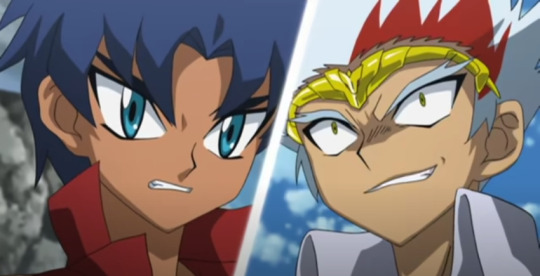
And Kuaidul/my OC Hawk hehe. Feel free to tell me anymore examples! This dynamic is my bread and butter!
#yugioh#ygo#yugioh gx#ygo gx#gx#i'm in love with the villainess#my little pony friendship is magic#my little pony#mlp fim#beyblade#beyblade metal fight#beyblade metal saga#soulshipping#reilaire#rei x claire#fluttercord#discoshy#ryuga x king#royaltyshiping#fluttercord is a little bit of a stretch I admit#but it hits a lot of the same beats ya know?#and yes RyuKing is extremely fanon#ReiLaire were dating by the end of the anime and Soulship and Fluttercord were implied#RyuKing though I completely made up cuz it's fun
73 notes
·
View notes
Text

LOVE // MINE, ALL MINE
#my art#yugioh#yugioh gx#blood#soulshipping#judai yuki#yubel#really proud of this one woohoo. turns out i can render i just have to remember how to do it in a way i. know how to do it
51 notes
·
View notes
Text
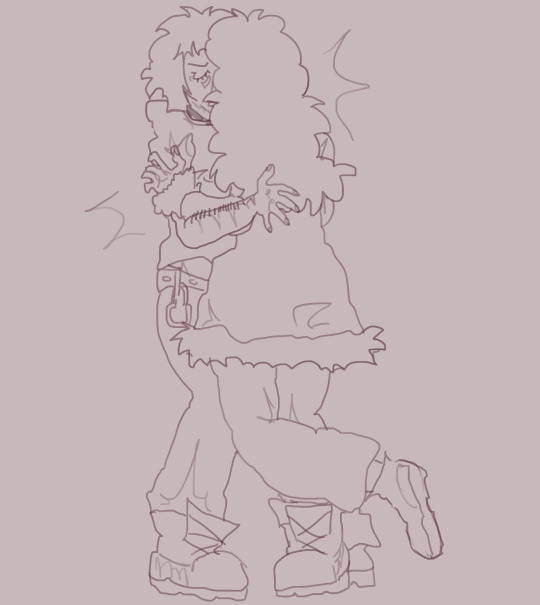
they're on the beach with comically oversized margaritas holding hands right now actually
#saw#amanda young#lesbian#saw x#gabriela saw#gabimanda#soulshipping#stallshipping#literally still dont know the ship name#dont look too hard at the shoes#wlw
110 notes
·
View notes